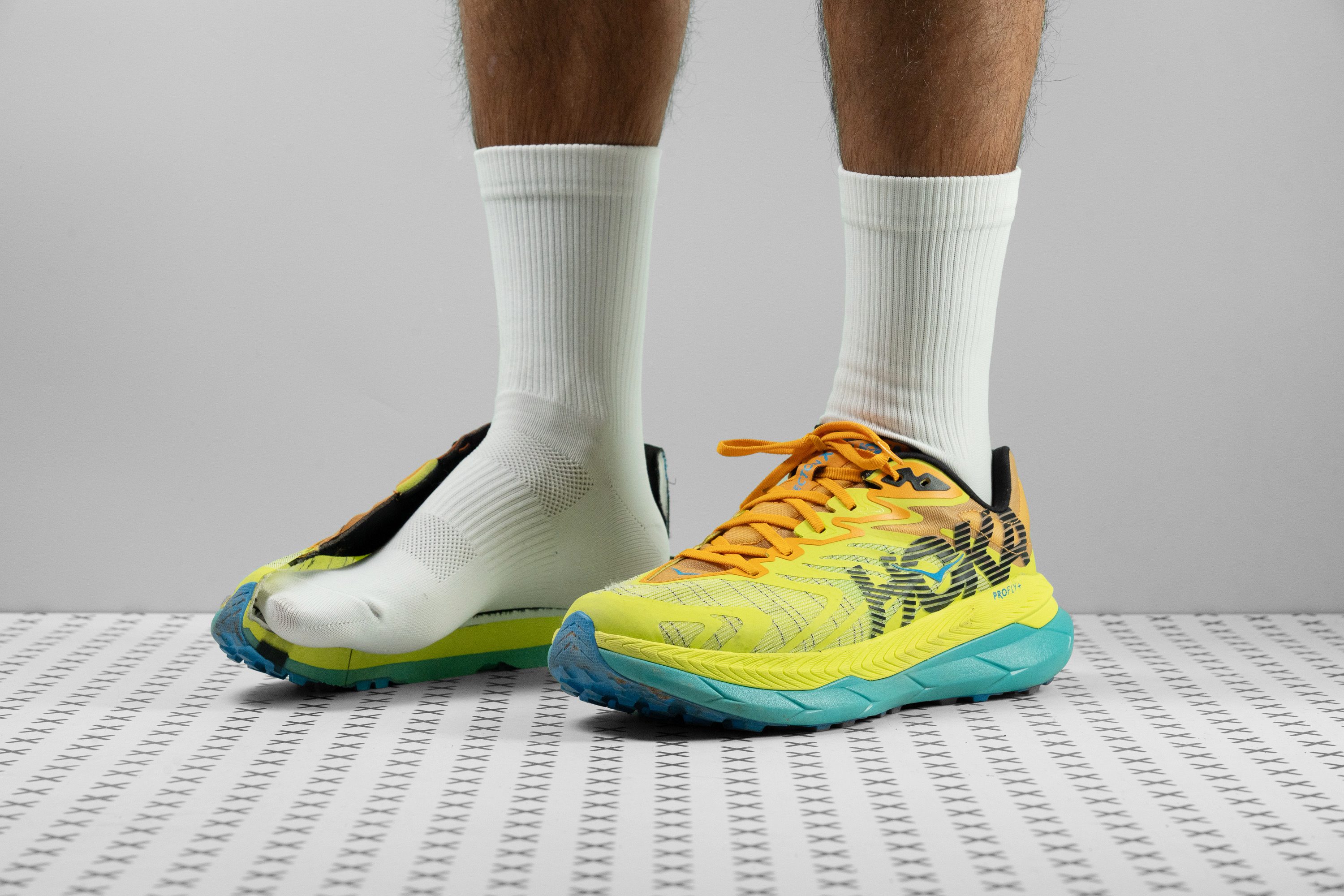Our verdict
- Top pick in best trail running shoes (2023)
- Top pick in best long distance running shoes (2023)
Pros
- Incredibly speedy and enjoyable ride
- Breathable yet sturdy upper
- Reliable traction across various terrains
- Exceptionally durable upper and outsole
- Surprisingly lighter
- Perfect for speedwork and racing on mild to moderate trails
- Sufficiently cushioned for ultra-distance comfort
- Accommodates all types of footstrikes effectively
Cons
- Limited space in the toe area
- Lacks energy return from the EVA midsole
- The $225 price tag might be steep for some buyers
Audience verdict
Comparison
The most similar running shoes compared
+ + Add a shoe | |||||
|---|---|---|---|---|---|
| Audience score | 88 Great! | 84 Good! | 89 Great! | 87 Great! | |
| Price | $225 | $275 | $260 | $200 | |
| Trail terrain | Moderate | LightModerate | LightModerate | Moderate | |
| Shock absorption | - | High | High | Moderate | |
| Energy return | - | High | High | High | |
| Arch support | Neutral | Neutral | Neutral | Neutral | |
| Weight lab Weight brand | 9.1 oz / 257g 8.8 oz / 249g | 9.7 oz / 275g 10.3 oz / 292g | 10.5 oz / 299g 10.1 oz / 286g | 9.5 oz / 269g 9.1 oz / 258g | |
| Drop lab Drop brand | 5.6 mm 5.0 mm | 6.9 mm 5.0 mm | 11.8 mm 8.5 mm | 7.1 mm 6.0 mm | |
| Strike pattern | Mid/forefoot | Mid/forefoot | Heel | Mid/forefoot | |
| Size | Slightly small | Slightly small | True to size | True to size | |
| Midsole softness | Balanced | Soft | Soft | Soft | |
| Difference in midsole softness in cold | Small | Small | Small | Small | |
| Plate | Carbon plate | Carbon plate | Carbon plate | Carbon plate | |
| Toebox durability | Good | Good | Very bad | - | |
| Heel padding durability | Bad | Decent | Good | - | |
| Outsole durability | Good | Good | Good | - | |
| Breathability | Moderate | Moderate | Moderate | Moderate | |
| Width / fit | Narrow | Narrow | Medium | Narrow | |
| Toebox width | Narrow | Medium | Wide | - | |
| Stiffness | Stiff | Stiff | Stiff | Stiff | |
| Torsional rigidity | Stiff | Stiff | Stiff | Stiff | |
| Heel counter stiffness | Moderate | Flexible | Moderate | Moderate | |
| Lug depth | 3.6 mm | 4.0 mm | 3.0 mm | 3.4 mm | |
| Heel stack lab Heel stack brand | 37.4 mm 32.0 mm | 37.8 mm 40.0 mm | 36.6 mm 38.0 mm | 33.4 mm 36.0 mm | |
| Forefoot lab Forefoot brand | 31.8 mm 27.0 mm | 30.9 mm 35.0 mm | 24.8 mm 29.5 mm | 26.3 mm 30.0 mm | |
| Widths available | Normal | Normal | NormalWide | Normal | |
| Season | All seasons | All seasons | All seasons | All seasons | |
| Removable insole | ✓ | ✓ | ✓ | ✓ | |
| Orthotic friendly | ✓ | ✓ | ✓ | ✓ | |
| Waterproofing | - | Water repellent | - | - | |
| Ranking | #300 Top 44% | #233 Bottom 39% | #88 Top 23% | #164 Top 43% | |
| Popularity | #451 Bottom 34% | #155 Top 41% | #229 Bottom 40% | #271 Bottom 29% |
Who should buy
Based on our tests, the Hoka Tecton X 2 is an excellent pick for:
- Trail enthusiasts looking for a feather-light, carbon-plated shoe for racing or tempo training.
- Hoka aficionados willing to invest in the absolute best trail shoe from their preferred brand, regardless of the price tag.
- Runners seeking a high-end, cushioned shoe that's perfect for ultra-distance challenges.
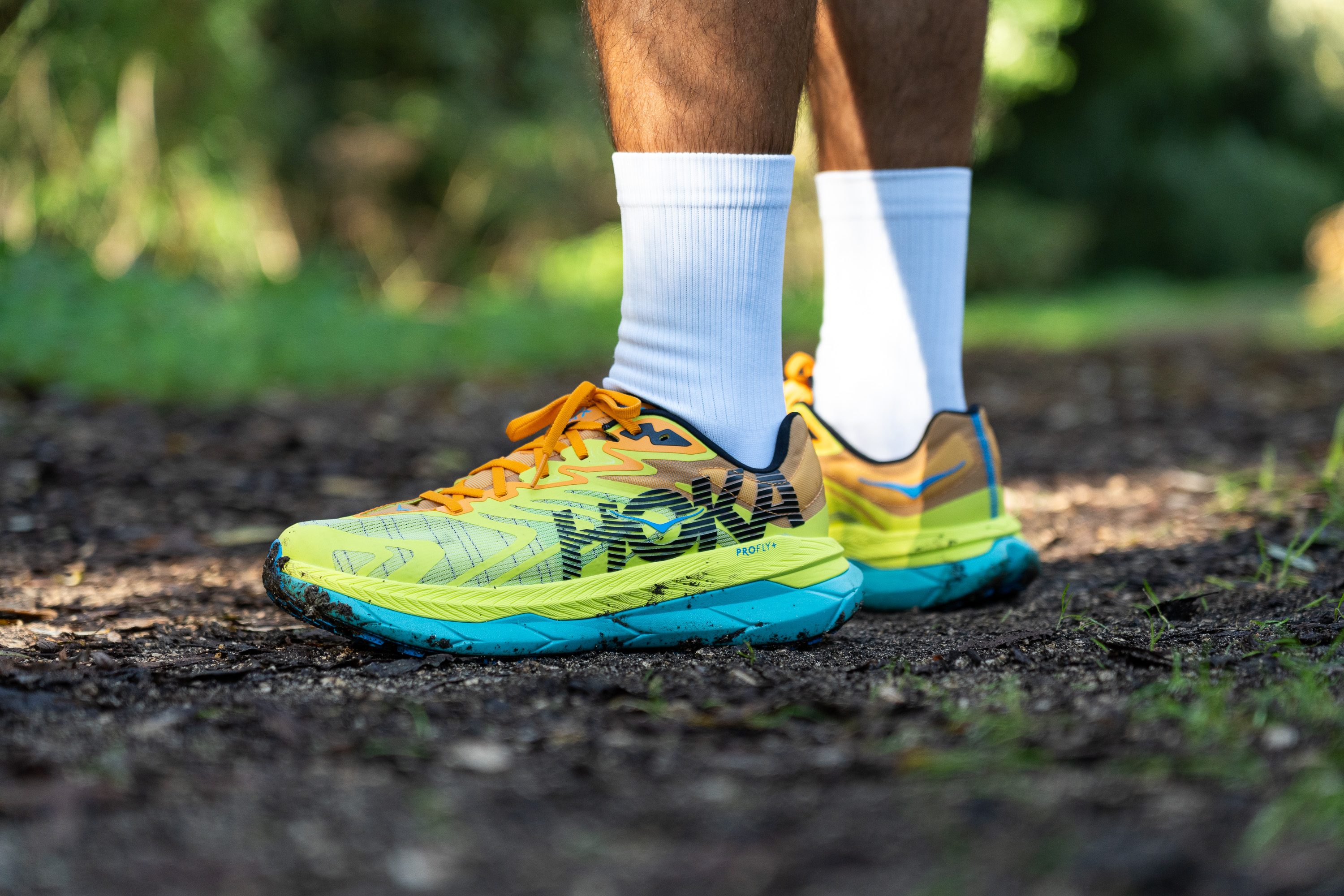
Who should NOT buy
If you're in the market for a racing shoe for the trails but have wide feet, the Tecton X 2 might not be the best fit. Thankfully, many brands now offer top-tier trail racing shoes. For instance, we discovered the Nike Ultrafly not only accommodates wider feet but also comes with the bonus of a full-length, responsive ZoomX midsole.
Concerned about the $225 price tag? There are still nice alternatives, though you might have to forego the carbon plate. We liked the Hoka Speedgoat 5, which also boasts a Vibram outsole and a light build, while the Saucony Peregrine 13 stands out as a jack-of-all-trades option that's easier on the budget.
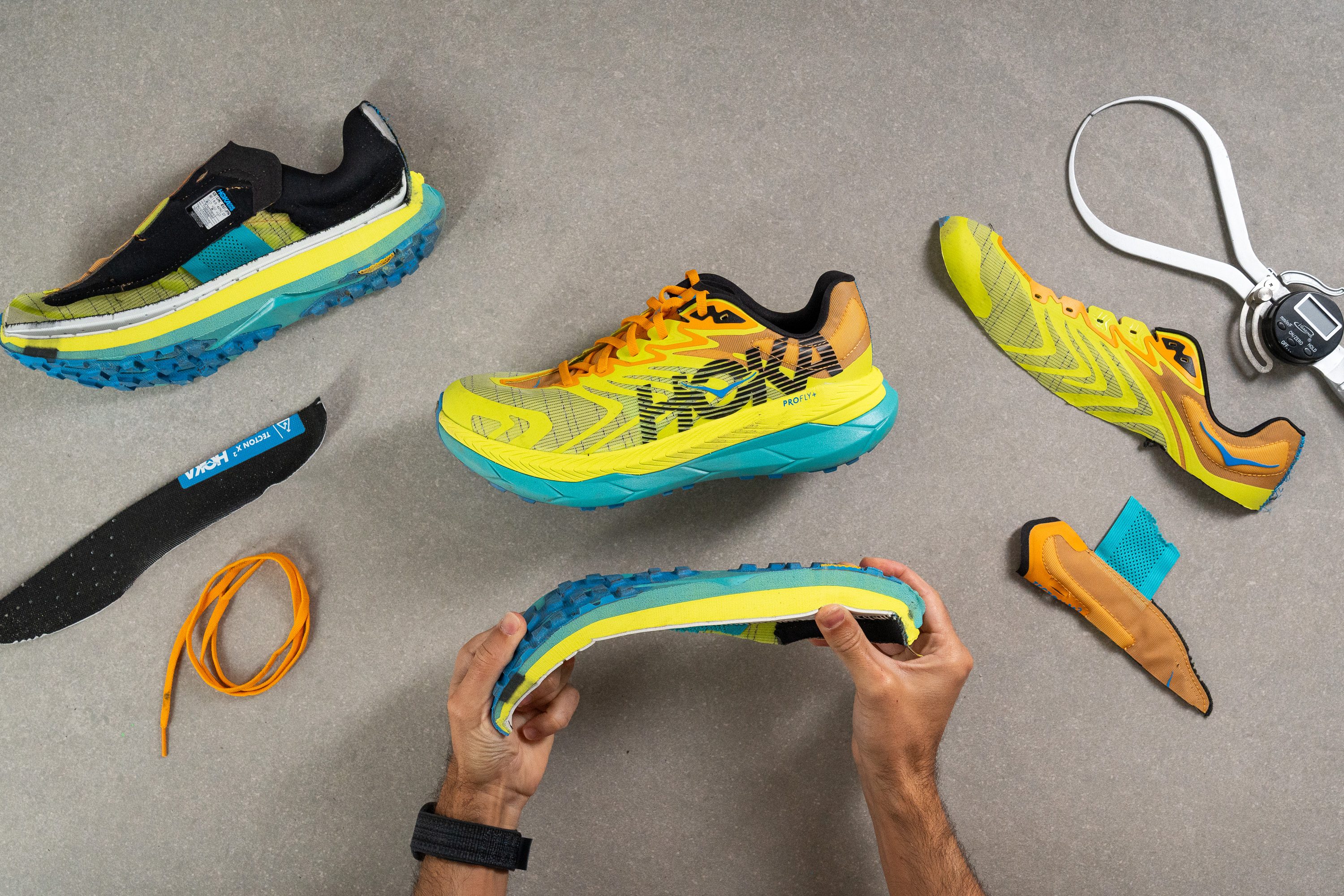
Cushioning
Heel stack
Designed with Jim Walmsley's input, this shoe is built to assist ultrarunners in conquering hundreds of miles.
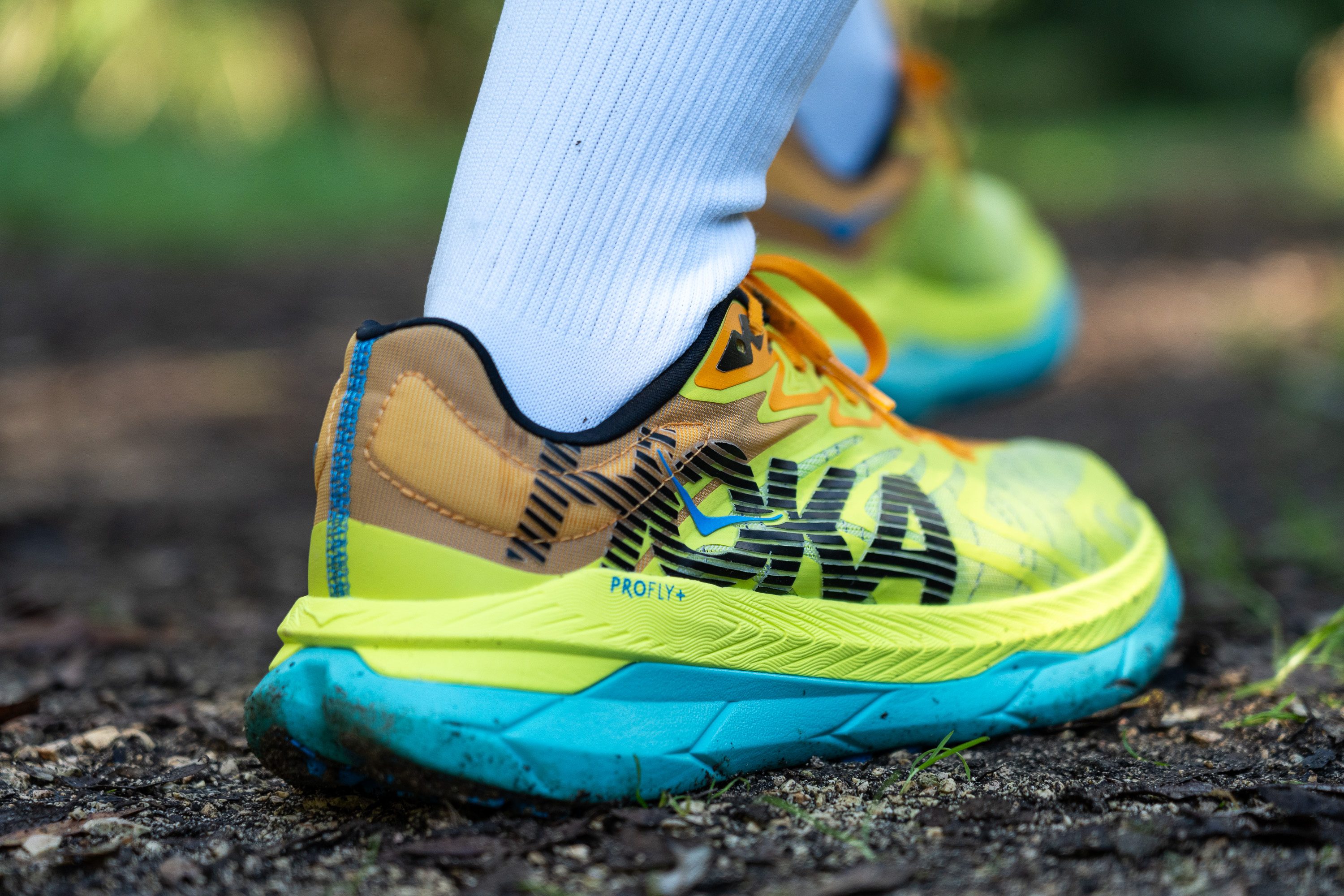
That's why it boasts a substantial 37.4 mm in the heel, offering ample dual-density ProFly+ cushioning for such demanding distances.
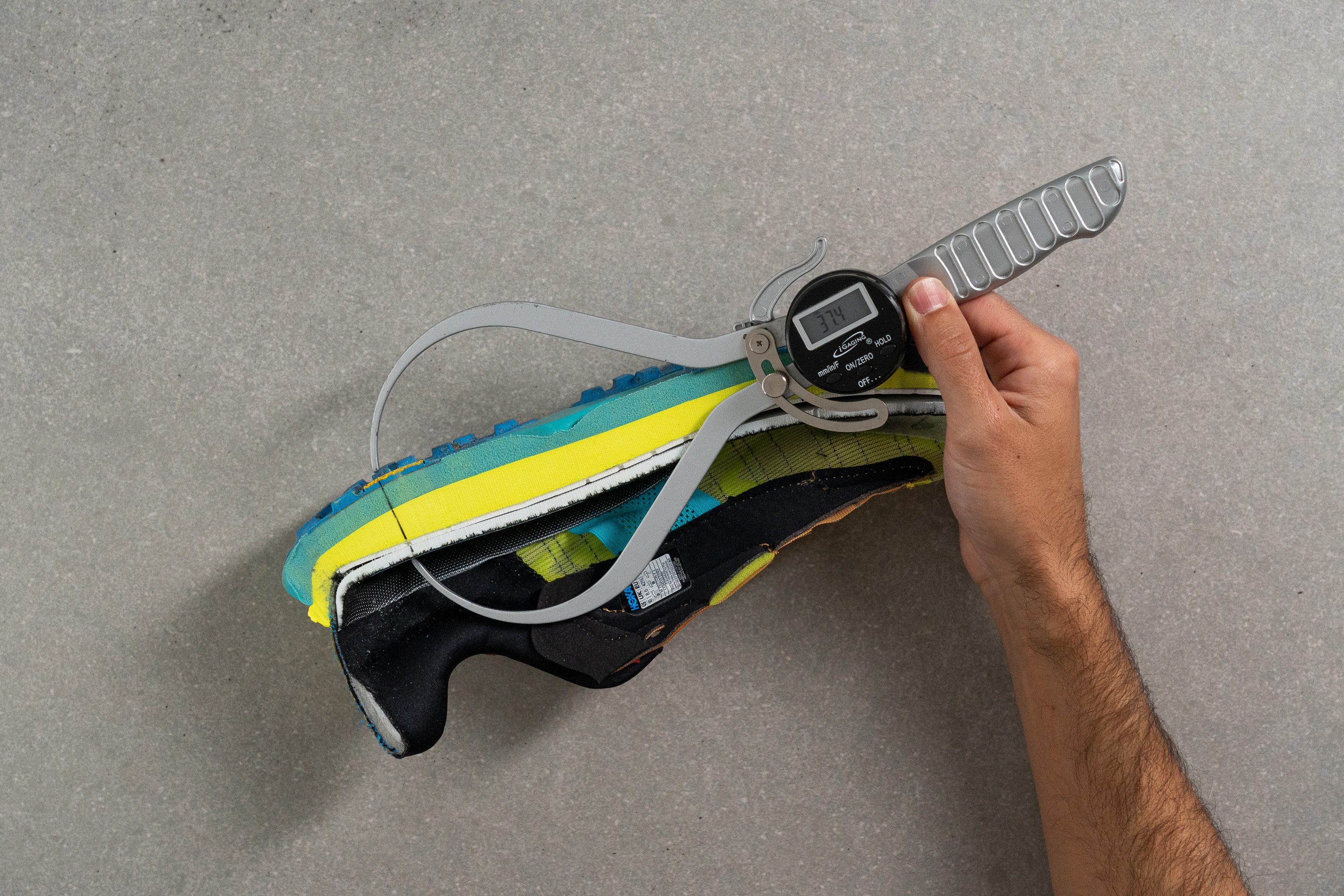
| Hoka Tecton X 2 | 37.4 mm |
| Average | 32.6 mm |
Forefoot stack
The forefoot also packs plenty of cushioning, measuring 31.8 mm.
This is excellent news for midfoot and forefoot strikers looking to cover ultra distances in the Tecton X 2.
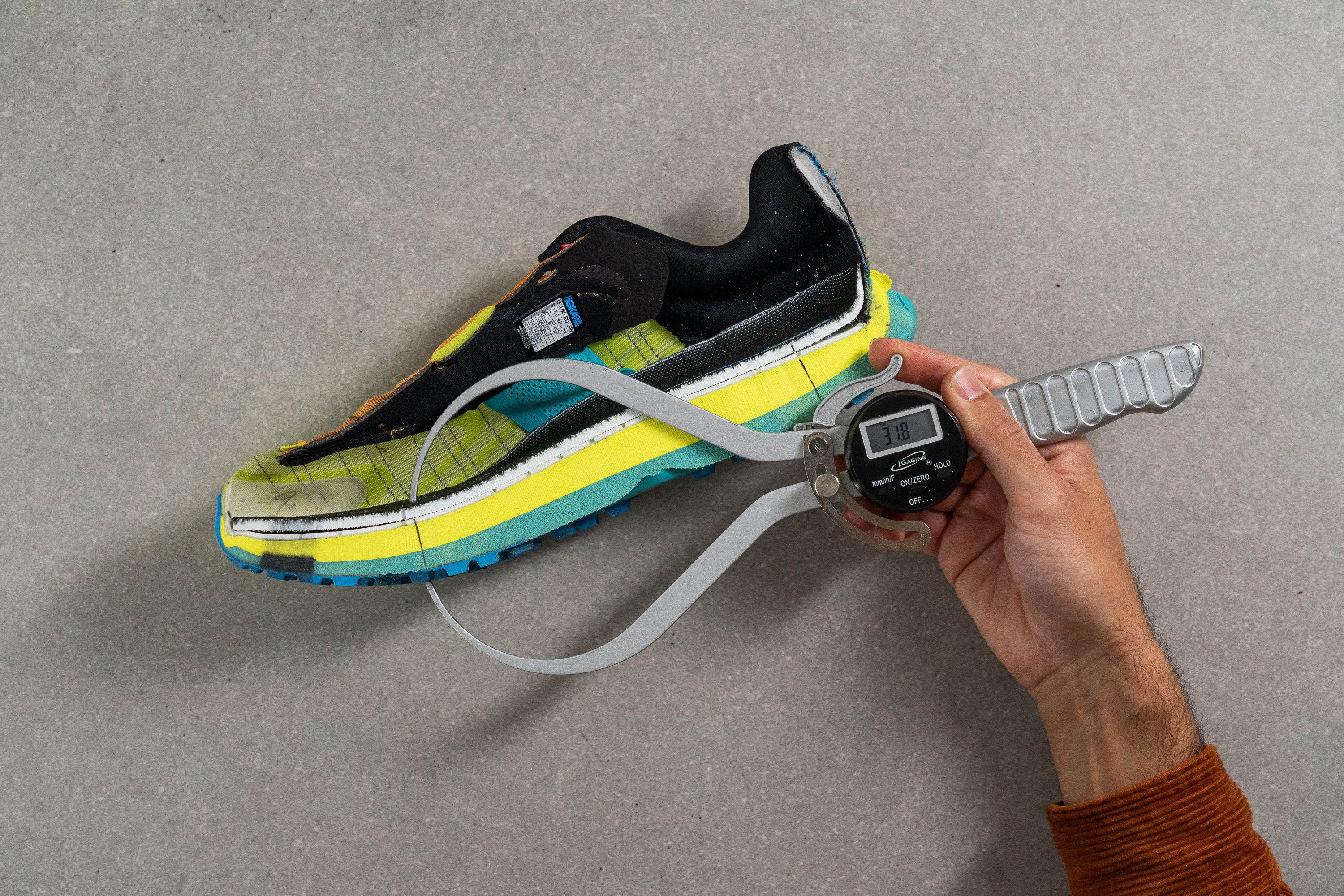
| Hoka Tecton X 2 | 31.8 mm |
| Average | 25.1 mm |
Drop
This results in a real 5.6-mm heel-to-toe drop, closely aligning with Hoka's official claim of a 5-mm drop, as measured according to World Athletics guidelines.
The small difference between what brands say and what we measure may be interesting to you. If that's the case, check out our guide for more details.
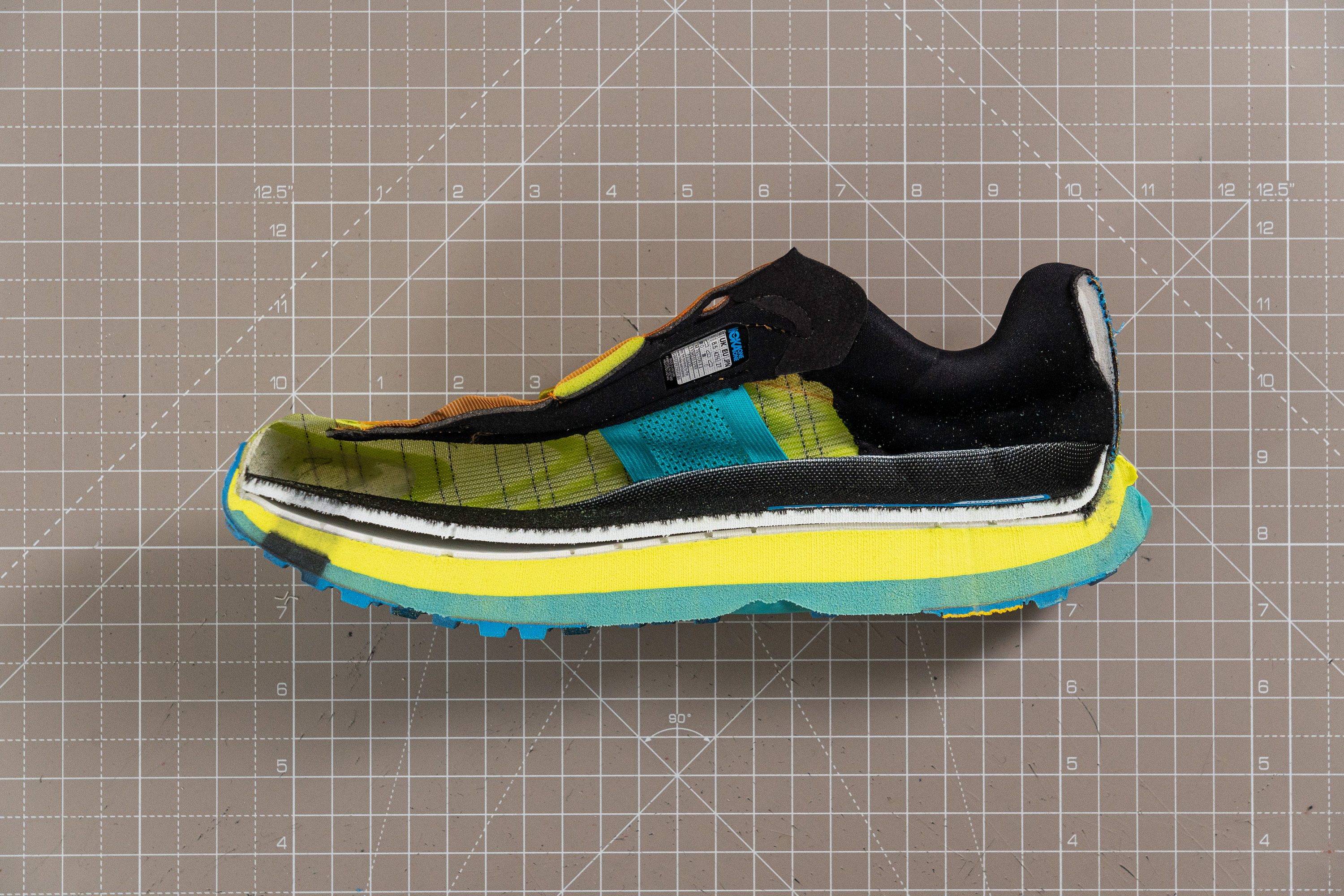
| Hoka Tecton X 2 | 5.6 mm |
| Average | 7.6 mm |
Midsole softness
The midsole is the star feature of the Tecton X 2. It's made up of a dual-density ProFlyX configuration, where two distinct layers of foam are separated by two carbon-fiber plates arranged in parallel. This unique setup, inspired by tectonic plates, even influenced the shoe's name.
We first measured the top layer of foam, which is closest to the feet and the softest. At 21.8 HA, it strikes a good balance between softness and stability, making it well-suited for trail racing.
However, there's a catch for us. With a $225 price tag, we expect to run in a world-class foam like PWRRUN PB in the Saucony Endorphin Edge. What we got instead was a CMEVA compound with run-of-the-mill energy return that doesn't quite match up to the best foams available in the market.
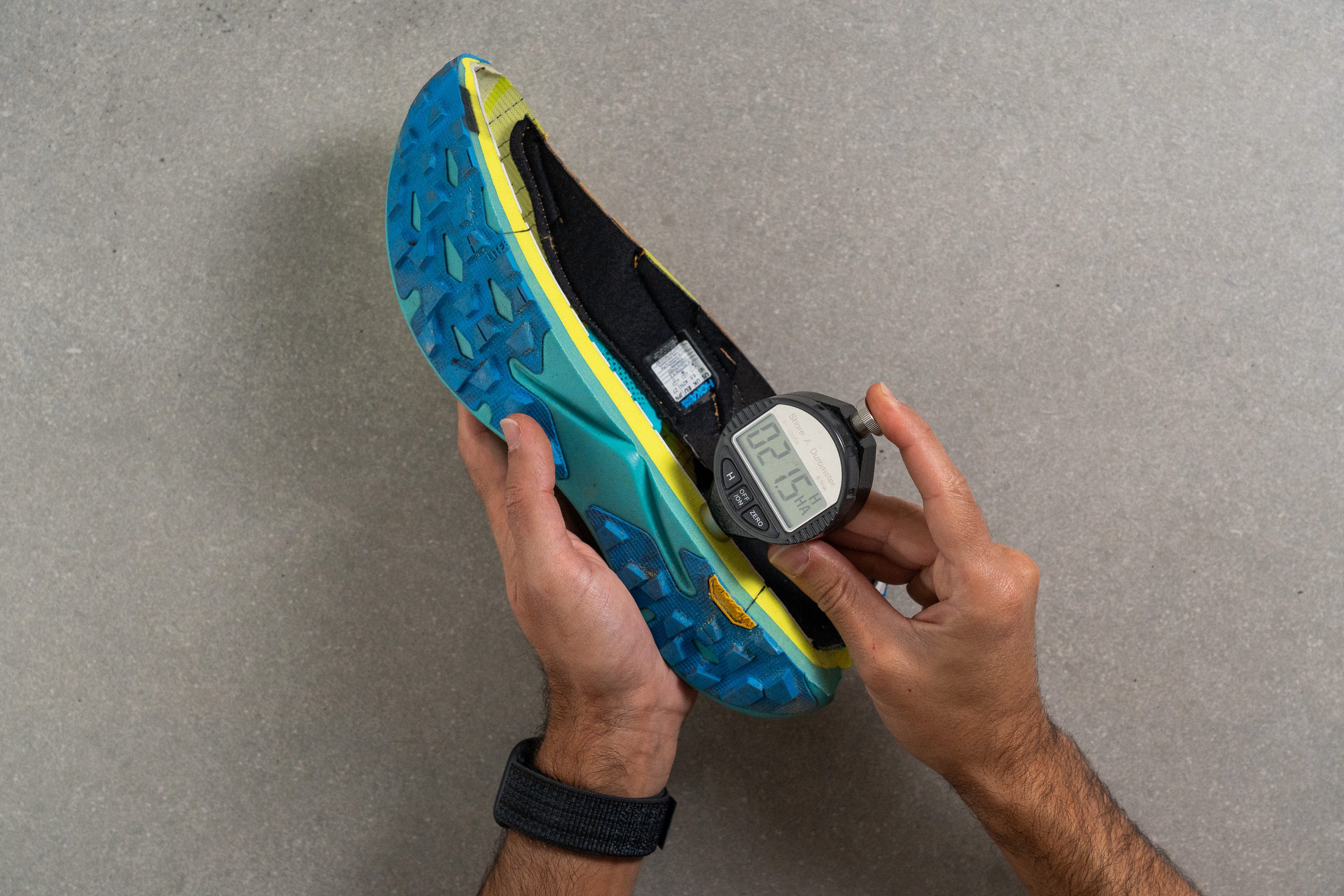
| Hoka Tecton X 2 | 21.8 HA |
| Average | 22.0 HA |
Secondary foam
We clocked the secondary foam's softness at 26.1 HA in the lab. This firmer, denser compound, positioned closer to the ground, enhances stability and protection.
We find this combination well-suited for trail use. It contrasts with what other brands are doing on the road with their dual-foam configurations. For example, ASICS with the Superblast places the softer foam (FFBlast+) nearer to the ground for a plush ride.
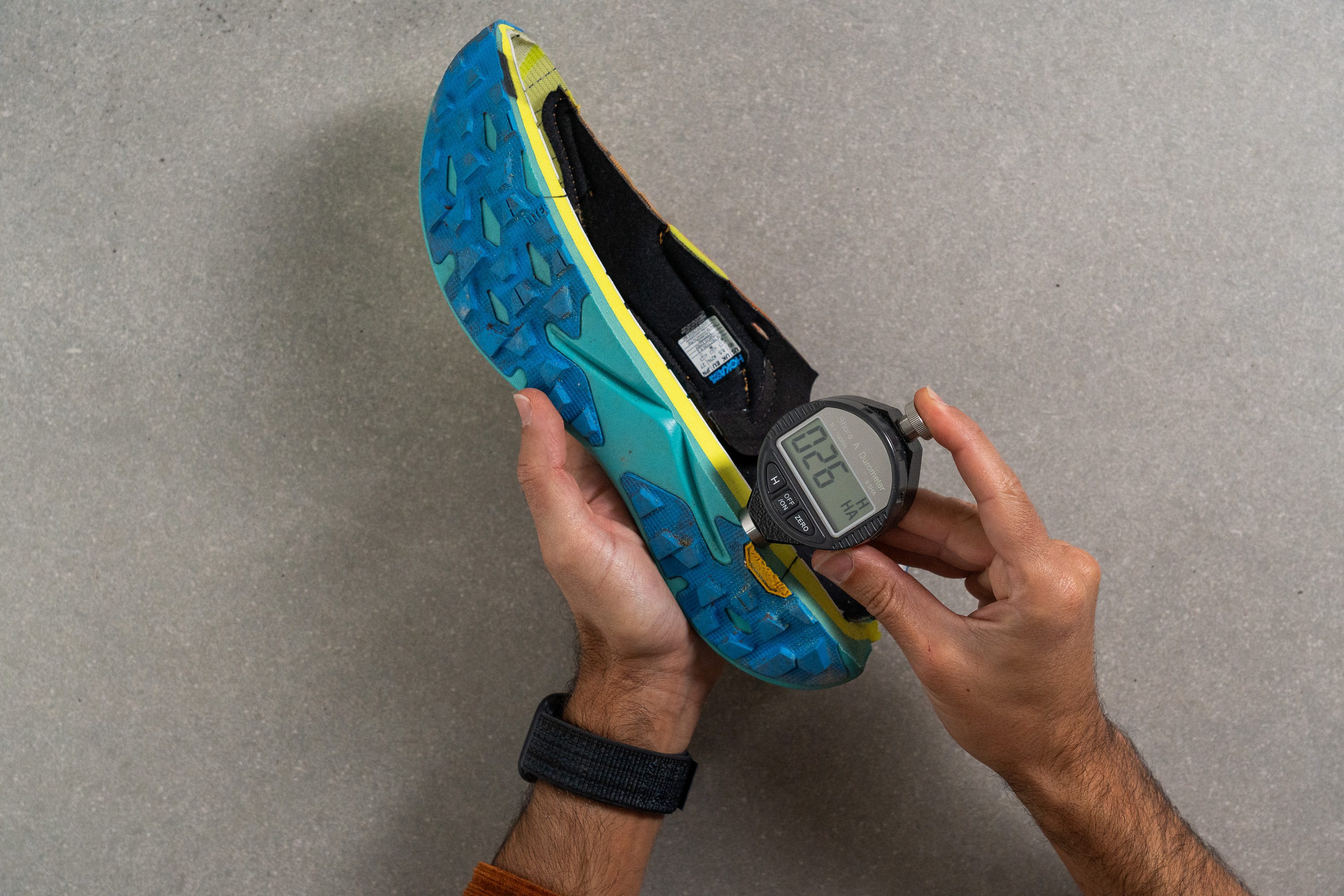
| Hoka Tecton X 2 | 26.1 HA |
| Average | 25.3 HA |
Size and fit
Size
Hoka Tecton X 2 fits slightly small (26 votes).
Internal length
| Hoka Tecton X 2 | 266.4 mm |
| Average | 269.0 mm |
Toebox width - widest part
Although the shoe's midsole is wide, the toebox tells a different story.
Measuring 96.0 mm at its widest point, you can expect a performance fit à la Hoka's racing shoes, like the Rocket X 2.
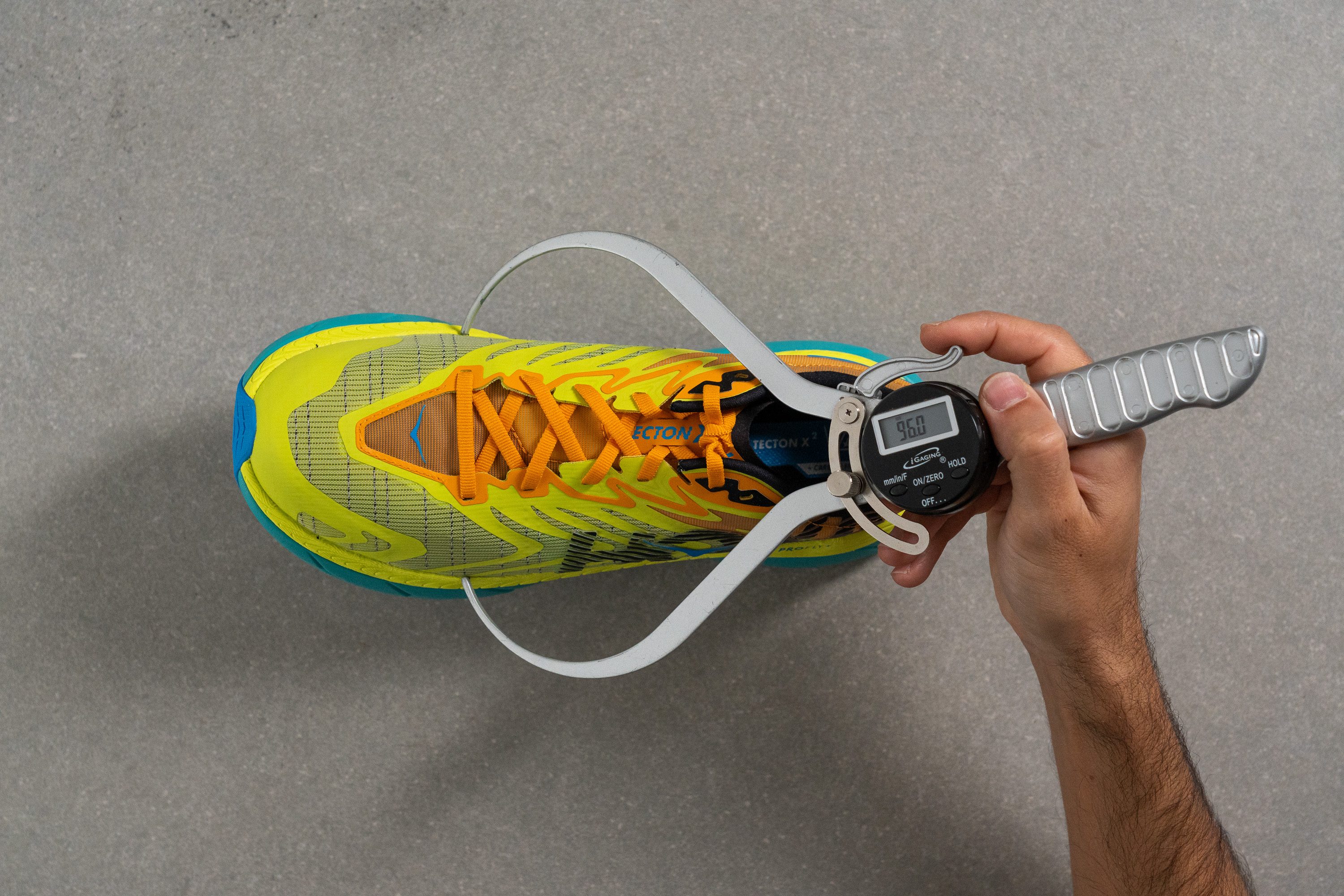
This test follows an older methodology, which is why you don't see recently tested shoes in the chart. Results from different methodologies can not be compared.
| Hoka Tecton X 2 | 96.0 mm |
| Average | 98.9 mm |
Toebox width - big toe
The measurement around the big toe area is quite narrow at 73.8 mm, which might be an issue for those with wider toes. If you're unsure, consider sizing up, particularly for ultra distances. This is important as feet tend to swell over long miles.
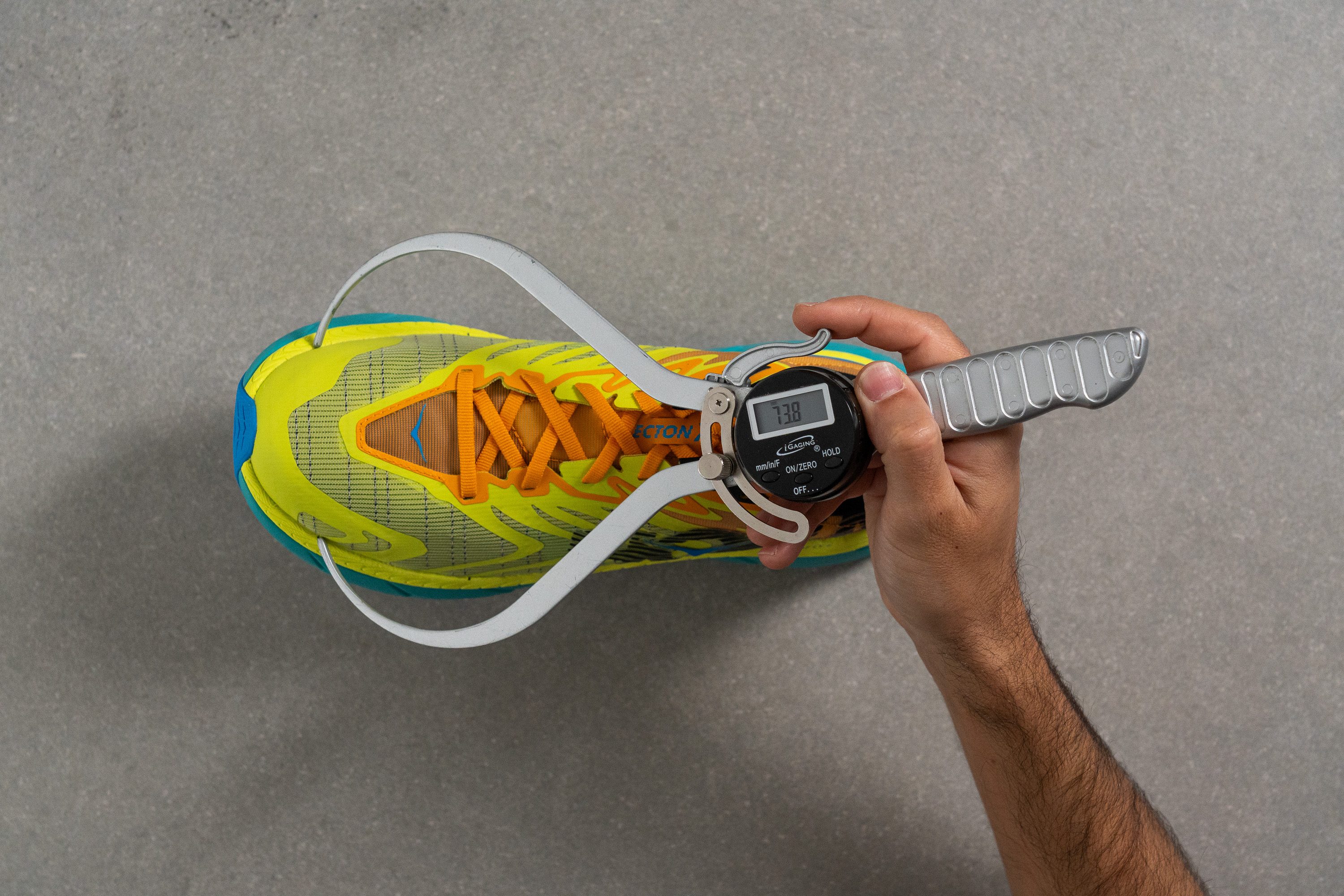
This test follows an older methodology, which is why you don't see recently tested shoes in the chart. Results from different methodologies can not be compared.
| Hoka Tecton X 2 | 73.8 mm |
| Average | 79.3 mm |
Traction / Grip
Lug depth
Regarding the lugs, it's always a tough call for brands, as it involves striking a balance. Opt for too short, and the shoe struggles on technical terrain or softer surfaces; choose deep lugs, and it underperforms on easy trails.
This is probably why Hoka chose a middle-ground approach with an average lug length of 3.6 mm, aiming to create a well-rounded shoe suitable for various trail conditions.
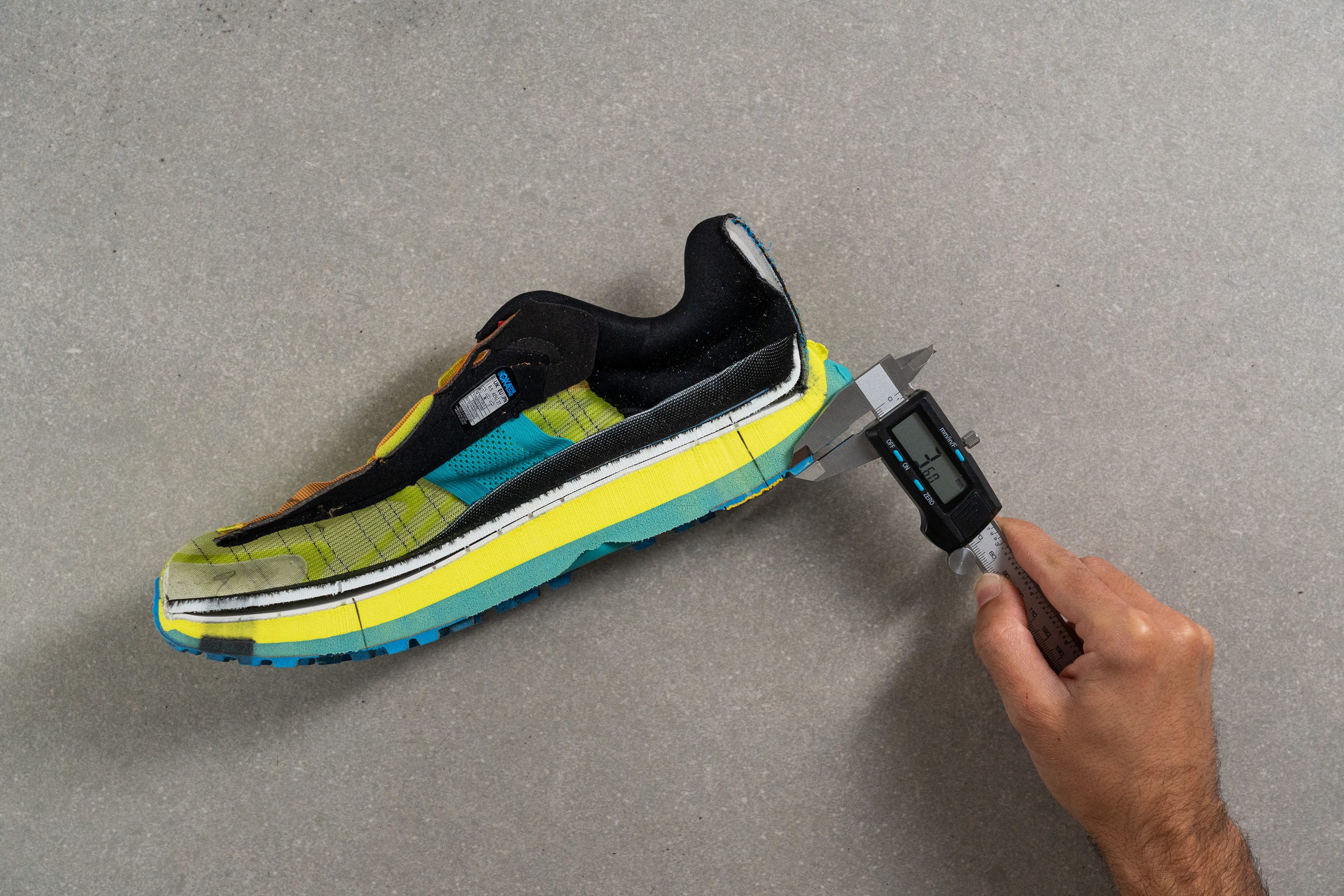
| Hoka Tecton X 2 | 3.6 mm |
| Average | 3.5 mm |
Flexibility / Stiffness
With not just one, but two carbon plates, most people would likely expect extreme stiffness. However, that's not the case, thanks to the plates being arranged in parallel, side by side.
This setup means they function like one plate but split down the middle, resulting in less stiffness than if it were a single, solid plate. That's why in our test, we only needed to apply 42.5N of force, which isn't a lot for a carbon-plated shoe.
This test follows an older methodology, which is why you don't see recently tested shoes in the chart. Results from different methodologies can not be compared.
| Hoka Tecton X 2 | 42.5N |
| Average | 27.1N |
Stiffness in cold
After placing the shoe in the freezer a second time to simulate cold conditions, we conducted the same test again. This time around, the force required was 51.4N.
| Hoka Tecton X 2 | 51.4N |
| Average | 35.9N |
Stiffness in cold (%)
This represents a 20.9% increase in stiffness, which should be hardly discernible, even during the chilliest trail adventures.
| Hoka Tecton X 2 | 21% |
| Average | 32% |
Weight
Weighing in at just 9.1 oz (257g), the Tecton X 2 stands as a remarkable example of creating a trail running shoe that's both lightweight and cushioned.
Kudos to Hoka—the shoe truly feels light and nimble underfoot.
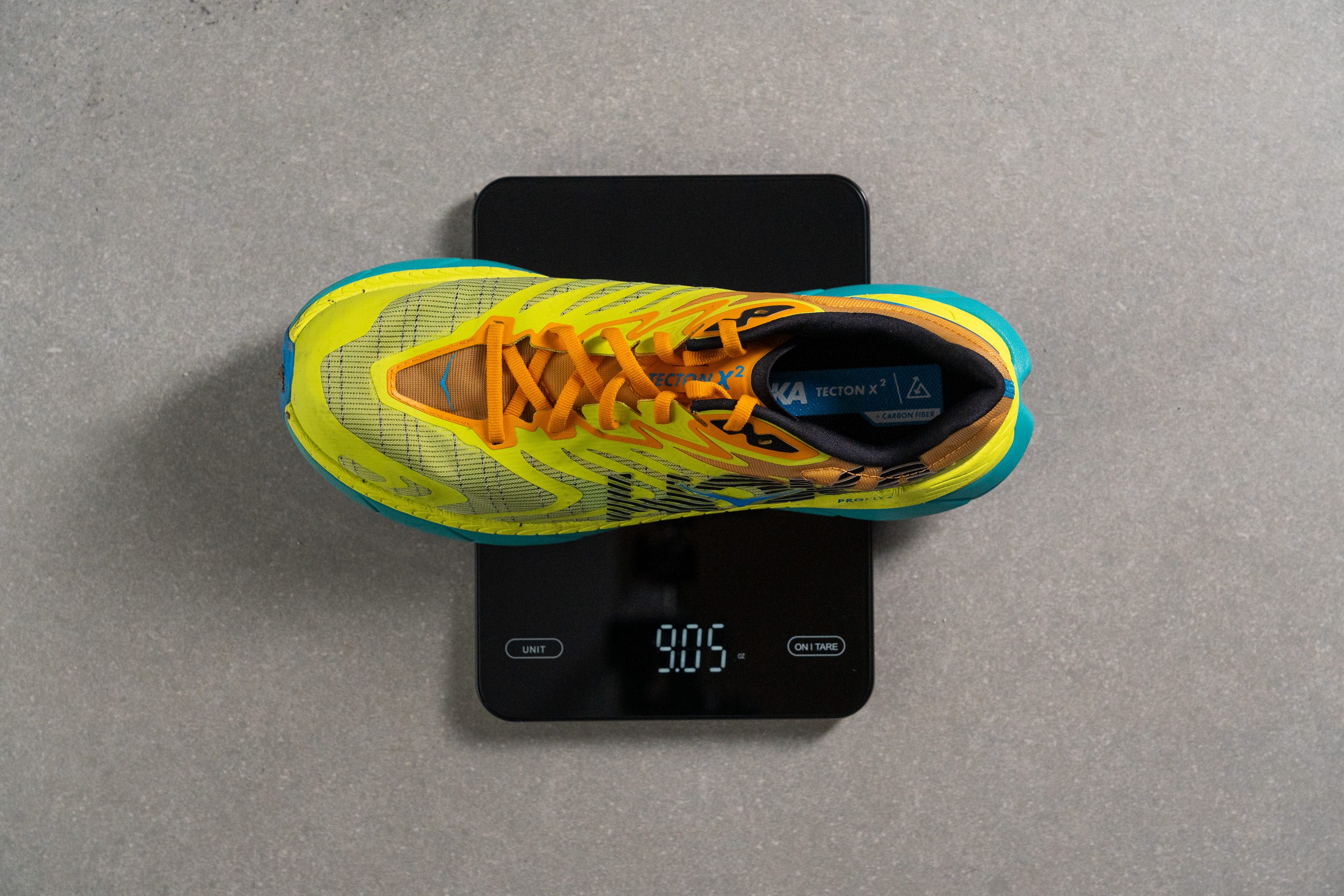
| Hoka Tecton X 2 | 9.1 oz (257g) |
| Average | 10.2 oz (289g) |
Breathability
Breathability in trail running shoes can be challenging as they need to be more rugged than road running shoes. Yet, Hoka's collaboration with MATRYX seemed quite promising to us in addressing this challenge.
In the Tecton X 2, we discovered an exceptionally breathable upper, perfectly suited for ultra-distance races. We rated it at 4/5 in this test.
Using a light, we identified the areas with the most breathability. The upper is thinner in the toebox and the front part of the medial side, providing breathability, while it becomes thicker in the midfoot and heel for added support.
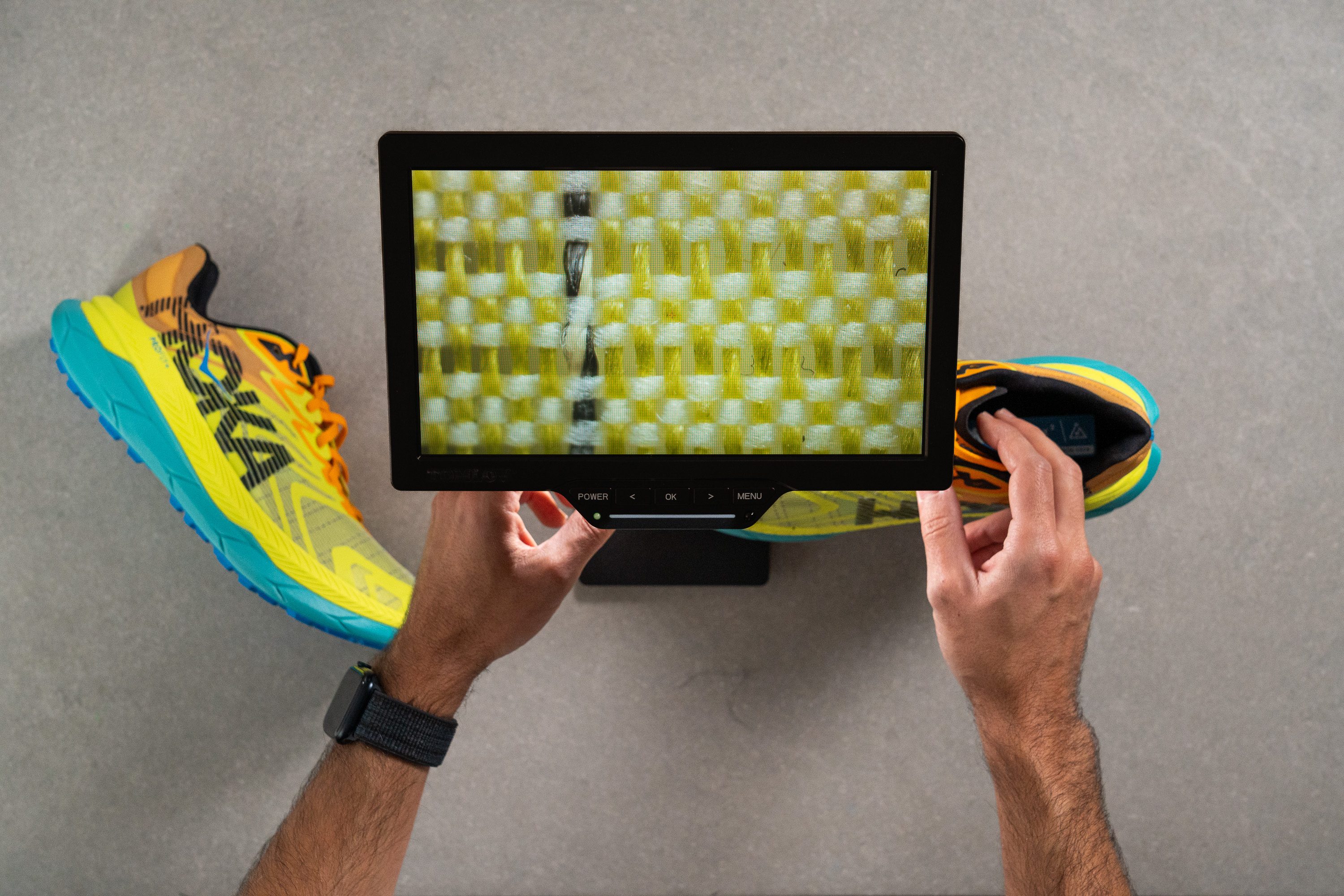
We then examined the MATRYX upper under a microscope to get a closer look.
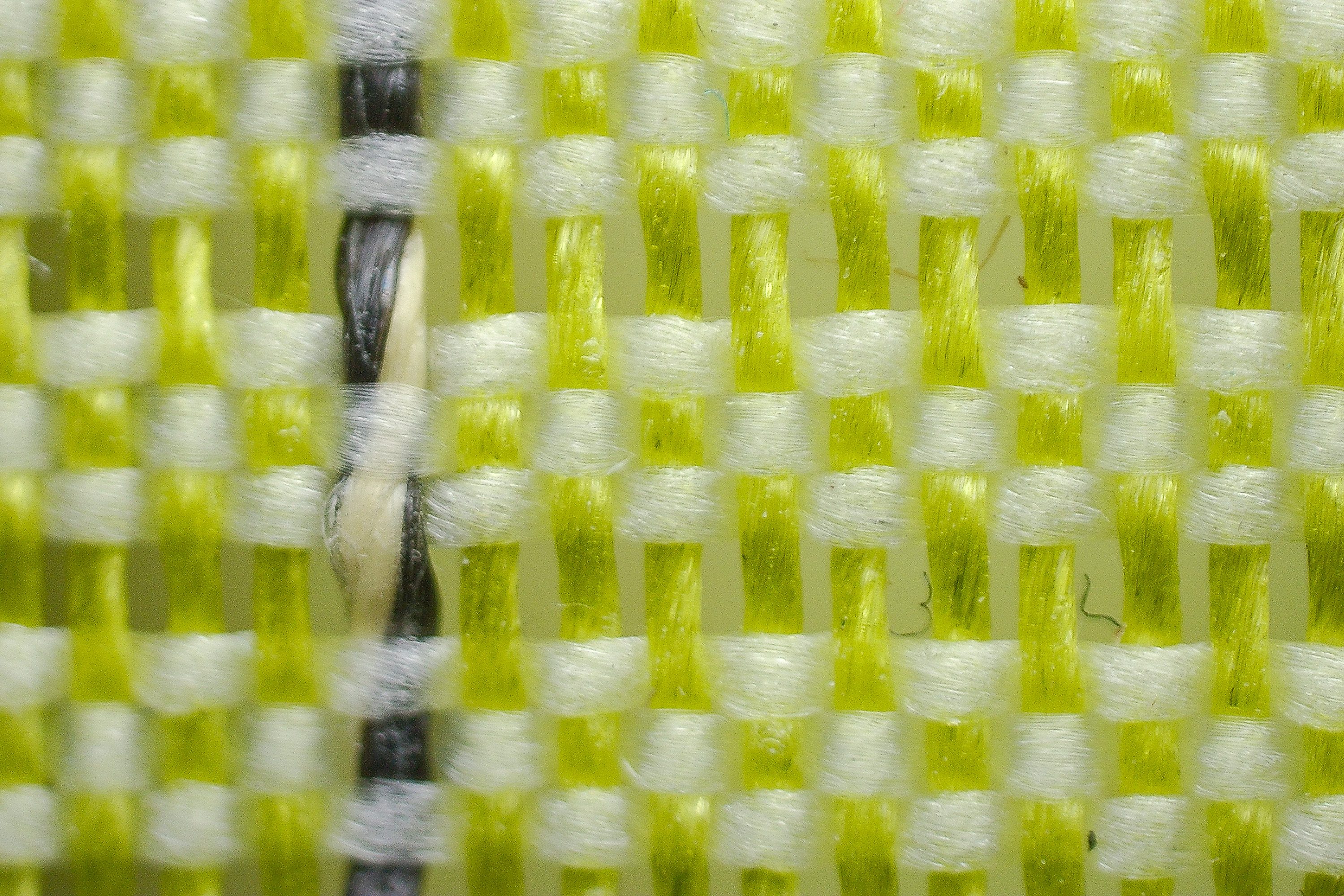
Surprisingly, there were hardly any holes for air flow, indicating the use of very thin mesh. This might raise some questions about durability, which we will explore in our next test.
Upon analyzing the cut upper, the contrast between the padded heel and midfoot areas and the race-focused, thin forefoot area was quite evident.
| Hoka Tecton X 2 | 4 |
| Average | 3.3 |
Stability
Lateral stability test
Featuring a well-balanced midsole softness, two parallel carbon plates, and a low heel-to-toe drop, we anticipated excellent stability despite its height, and that's exactly what the Tecton X 2 delivered.
We consistently felt stable in the shoe, even while running at high speeds during intervals in gravel roads and easy trails.
Torsional rigidity
Many runners believe carbon plates in top-tier running shoes are all about boosting propulsion, but their main advantage lies in increasing stability and rigidity.
This is clearly evident in the Tecton X 2. The dual parallel carbon plates earn it a solid 5/5 in our torsional rigidity test. So, don't anticipate a bendable, flexible shoe—it's quite the contrary.
| Hoka Tecton X 2 | 5 |
| Average | 3.6 |
Heel counter stiffness
The heel counter strikes a nice balance between stability and comfort, earning a solid 3 out of 5 from us. It effectively holds the heel in place and prevents any slippage, performing its job admirably.
| Hoka Tecton X 2 | 3 |
| Average | 3 |
Midsole width - forefoot
Now let's delve into the dimensions of the Tecton X 2. In the forefoot, we discovered a width of 114.6 mm, which is quite unexpected for a race-oriented shoe. Typically, these shoes feature narrower platforms to reduce weight and enhance agility.
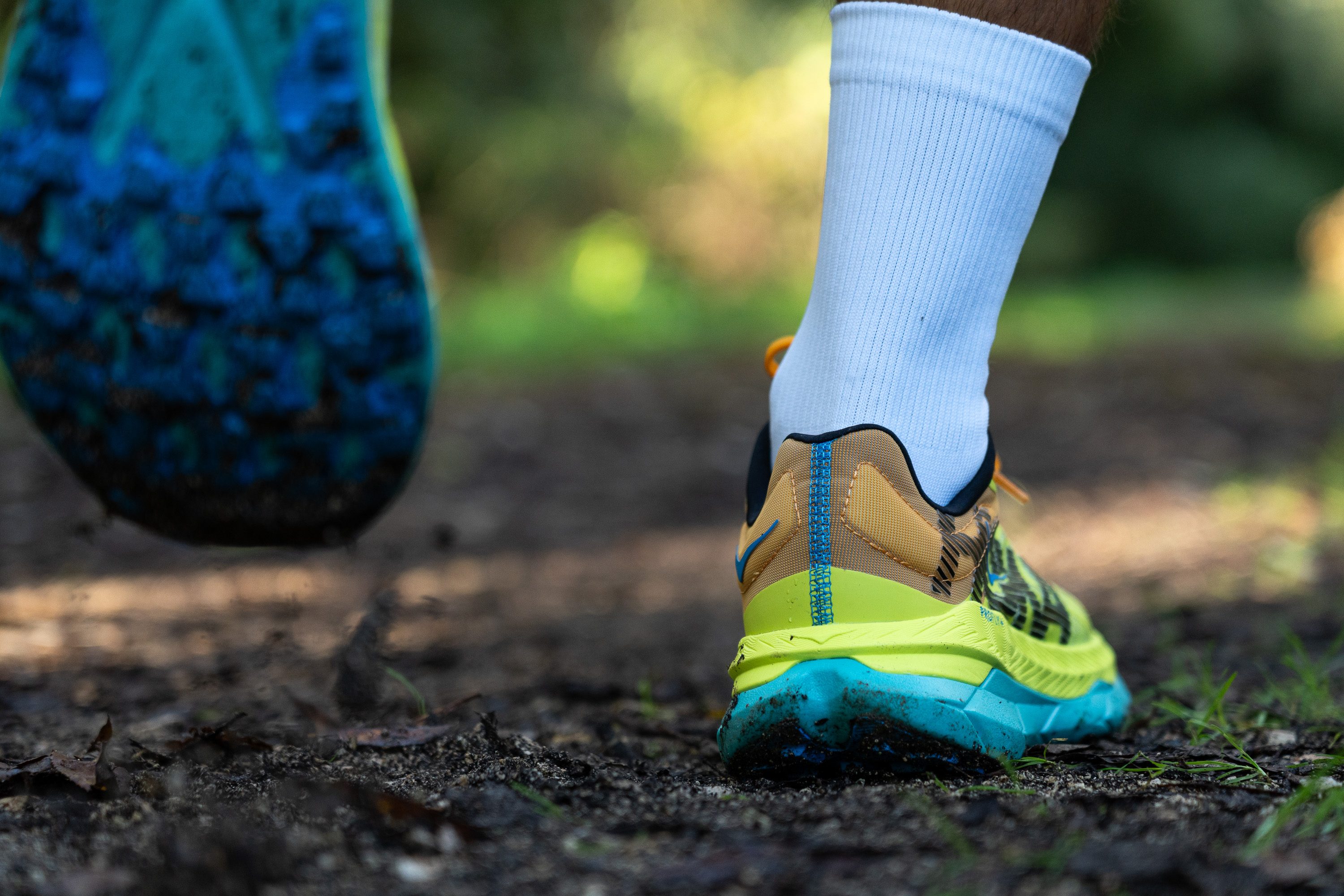
Yet, we believe this wider design is a smart approach, especially since this shoe is tailored for gravel paths and easy trails, with a focus on ultra-endurance events.
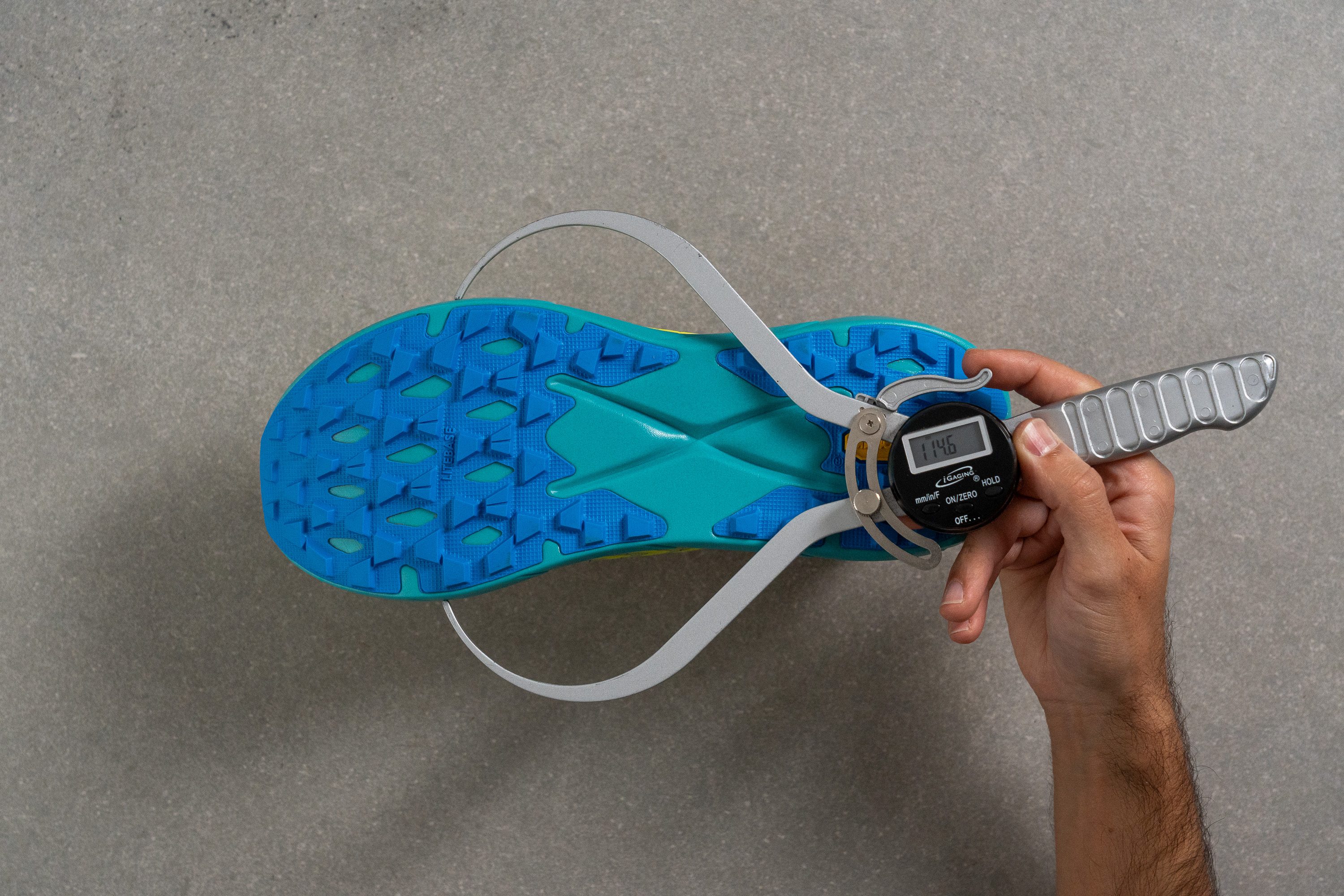
| Hoka Tecton X 2 | 114.6 mm |
| Average | 112.8 mm |
Midsole width - heel
The same thoughtful design approach is applied to the heel, boasting a width of 95.1 mm, making it particularly accommodating for rearfoot strikers.
Indeed, this is one of the most versatile shoes we have ever tested, catering to all types of footstrikes.
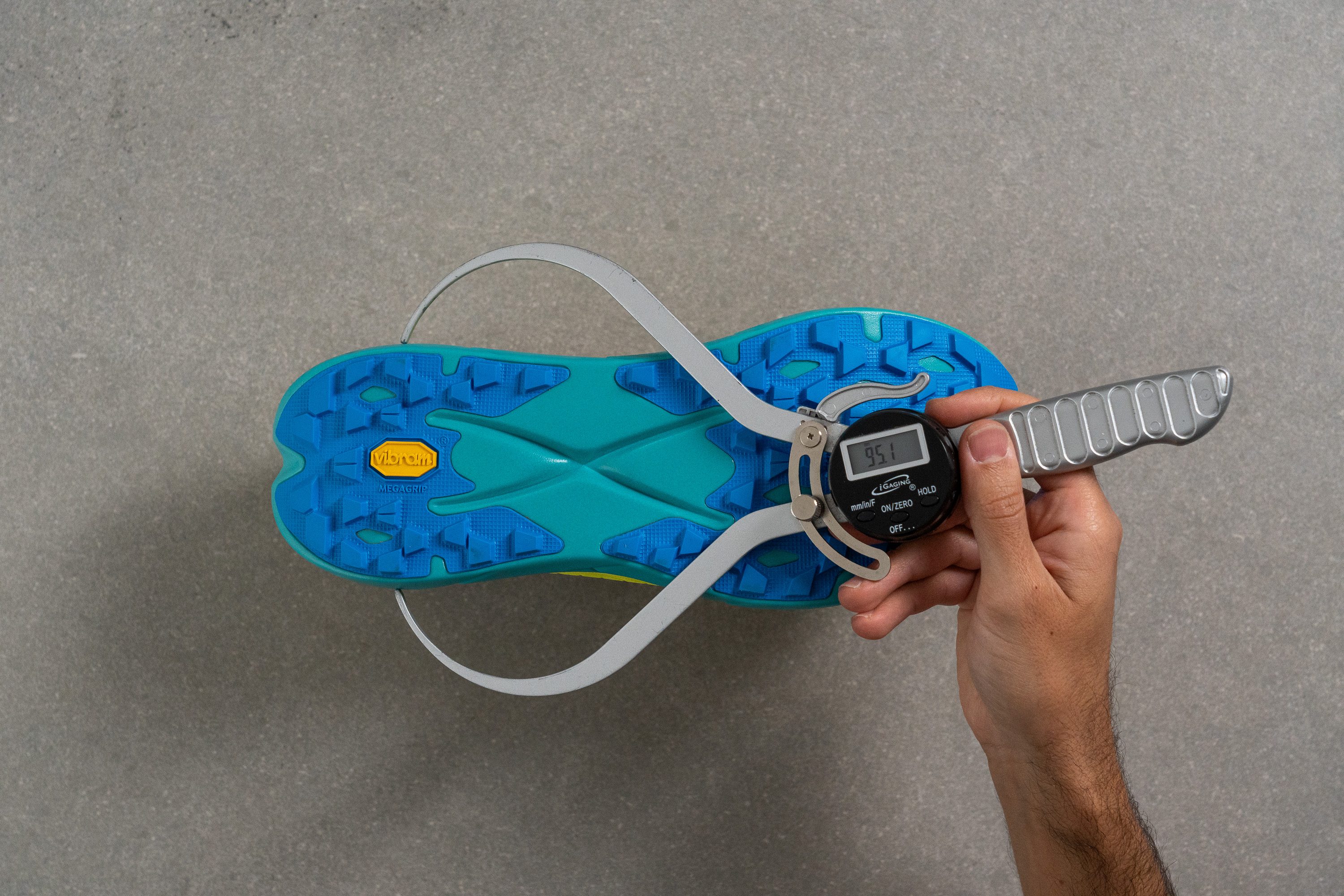
| Hoka Tecton X 2 | 95.1 mm |
| Average | 89.9 mm |
Durability
Toebox durability
Just earlier, we mentioned some initial concerns about the upper seeming rather thin. However, it was the Dremel test that revealed the true story of its durability.
To our pleasure, the upper held up remarkably well, scoring an impressive 4 out of 5.
This isn't just a great result; it positions the shoe as one of the few in the market that excels both in breathability and durability. Such high-quality performance is precisely what we expect from a shoe priced at $225.
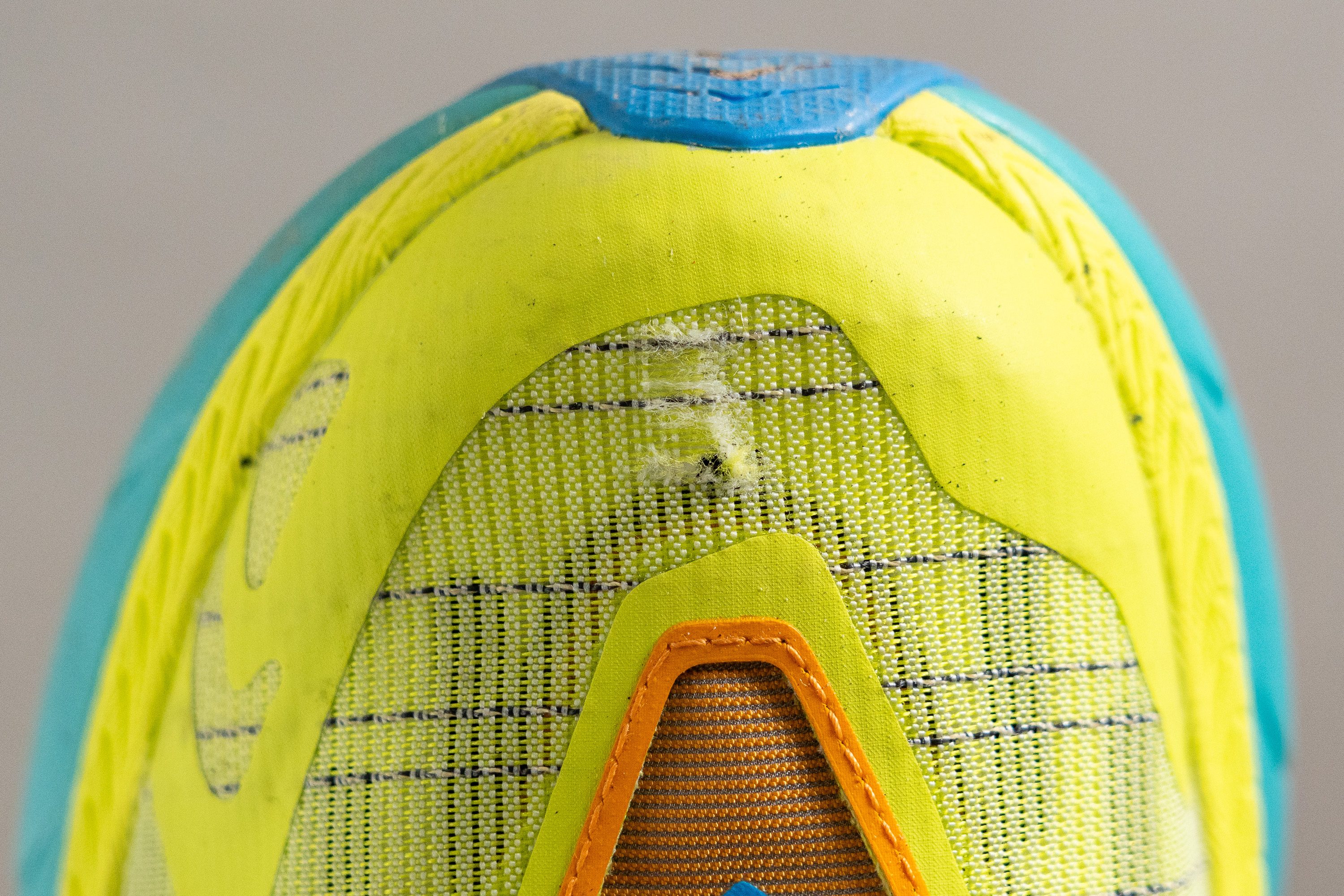
| Hoka Tecton X 2 | 4 |
| Average | 3.1 |
Heel padding durability
Yet, the heel tells a different story. In our back-to-back Dremel test, this area scored poorly, only achieving a 1 out of 5.
Therefore, runners who typically experience wear in the heel should tread cautiously with the Tecton X 2 and carefully select their socks.
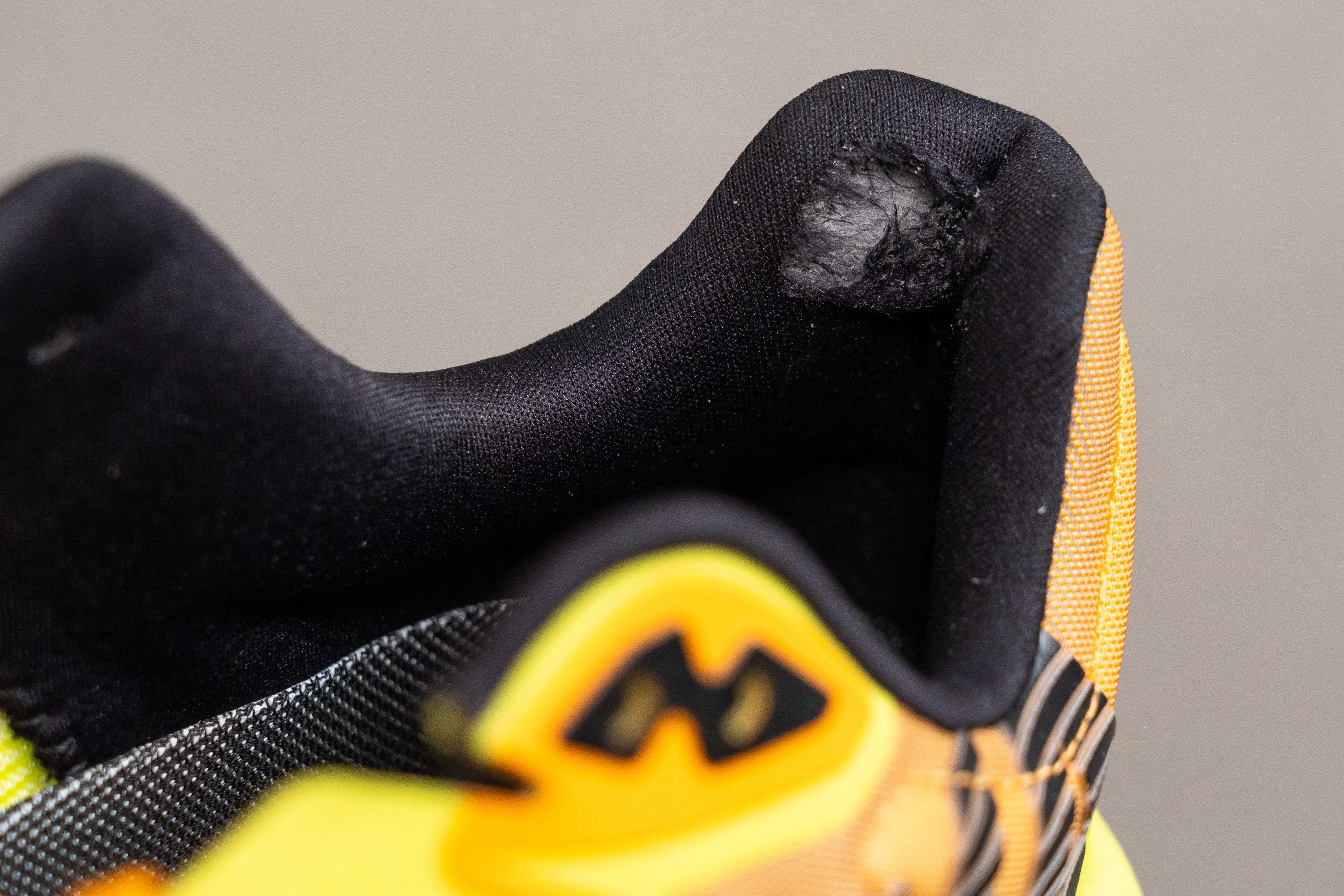
| Hoka Tecton X 2 | 1 |
| Average | 3 |
Outsole hardness
Transitioning to the outsole, we were excited to put the Vibram Megagrip Litebase compound to the test, widely regarded as the gold standard in the trail running industry.
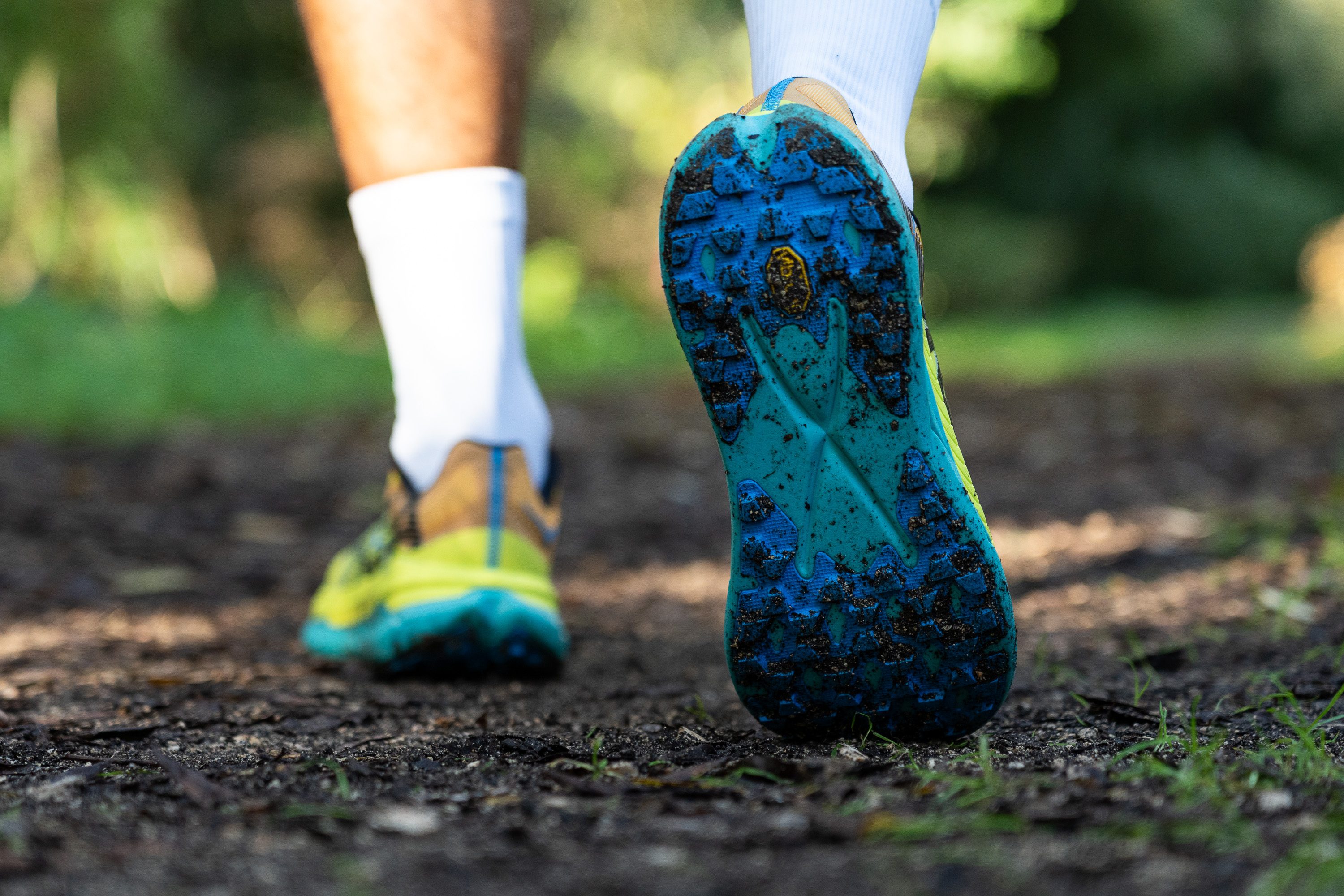
Our initial evaluation on the outsole focused on determining the rubber's hardness. True to expectations, it registered a solid 88.4 HC, indicating that it should offer excellent durability.
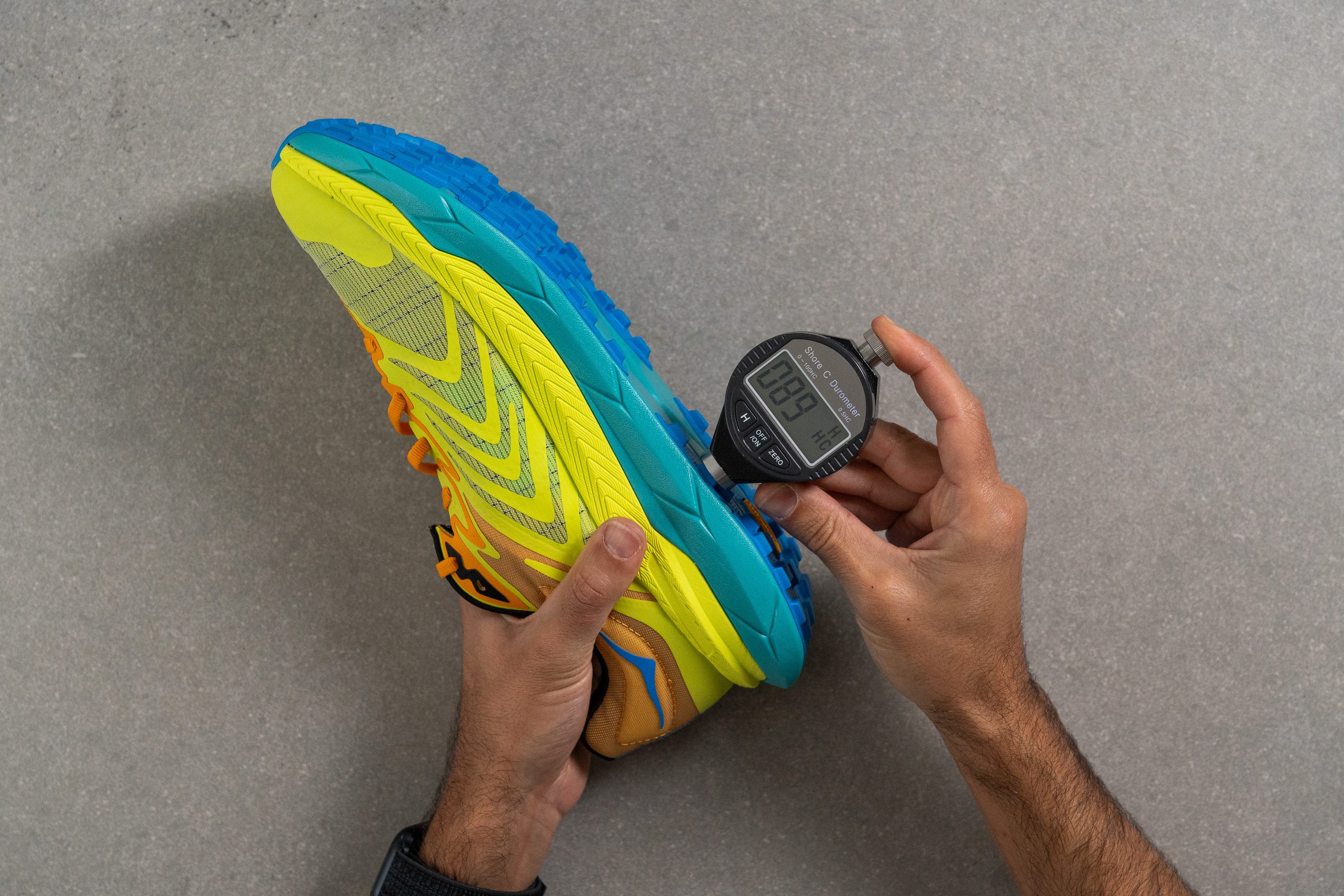
| Hoka Tecton X 2 | 88.4 HC |
| Average | 85.8 HC |
Outsole durability
We've established that the outsole is hard, but that doesn't automatically ensure durability.
Following our third Dremel test in the lab, we observed a mere 0.7-mm indentation in the rubber. This is a good performance, strongly suggesting that the outsole will be long-lasting and durable.
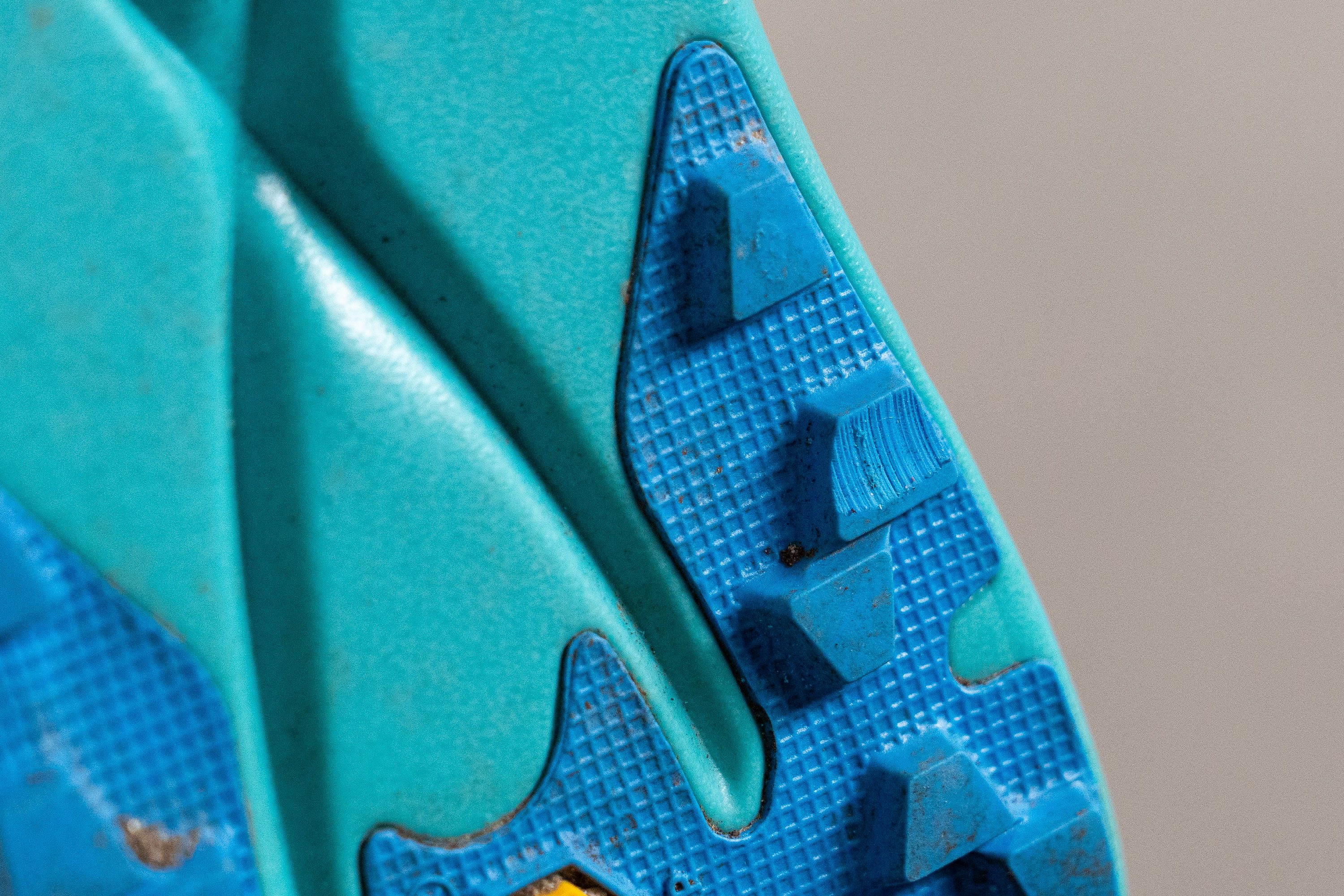
| Hoka Tecton X 2 | 0.7 mm |
| Average | 0.9 mm |
Outsole thickness
For the Tecton X 2, excelling in durability was crucial, especially since its outsole isn't the thickest around at 1.7 mm and there's a lot of exposed foam.
However, this thinner outsole has a silver lining—it enhances the plush sensation you feel while running, adding to the overall comfort.
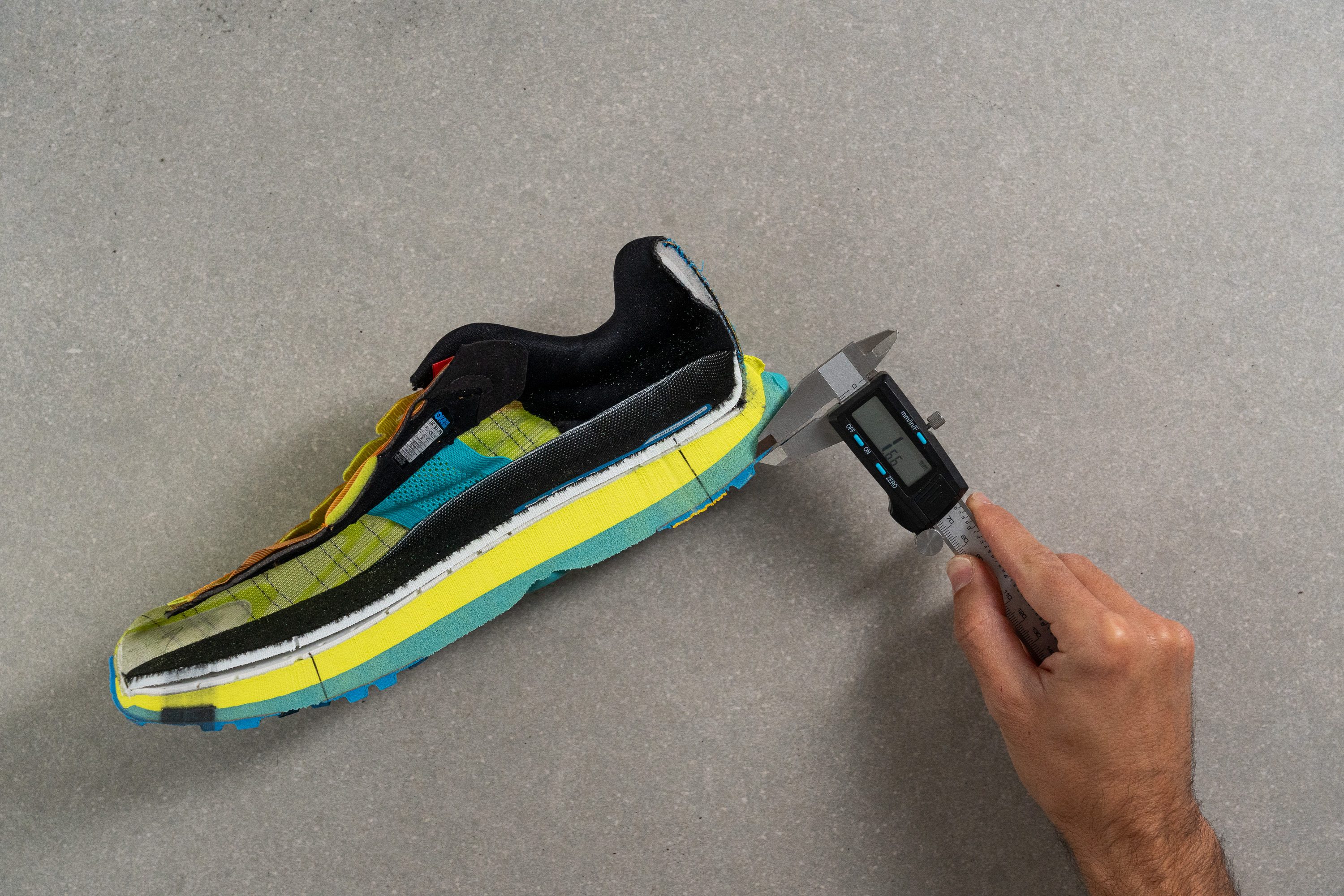
| Hoka Tecton X 2 | 1.7 mm |
| Average | 2.2 mm |
Misc
Insole thickness
The insole is pretty standard at 5.0 mm. We would have preferred a thinner insole with more foam instead, but it works fine.
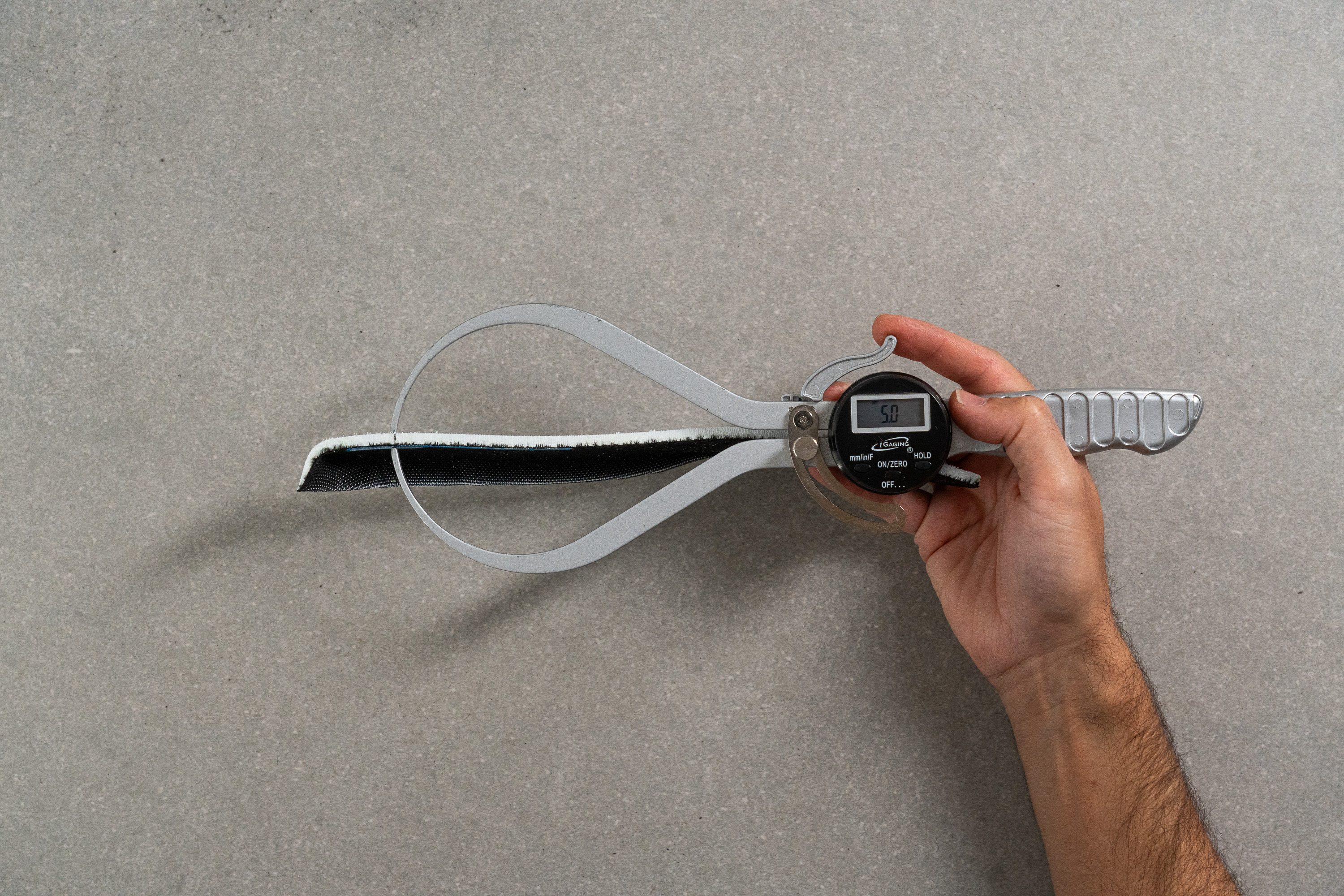
| Hoka Tecton X 2 | 5.0 mm |
| Average | 4.7 mm |
Removable insole
The insole can be taken out, and there's plenty of space inside the shoe. This allowed us to easily test OTC orthotics without any problems.
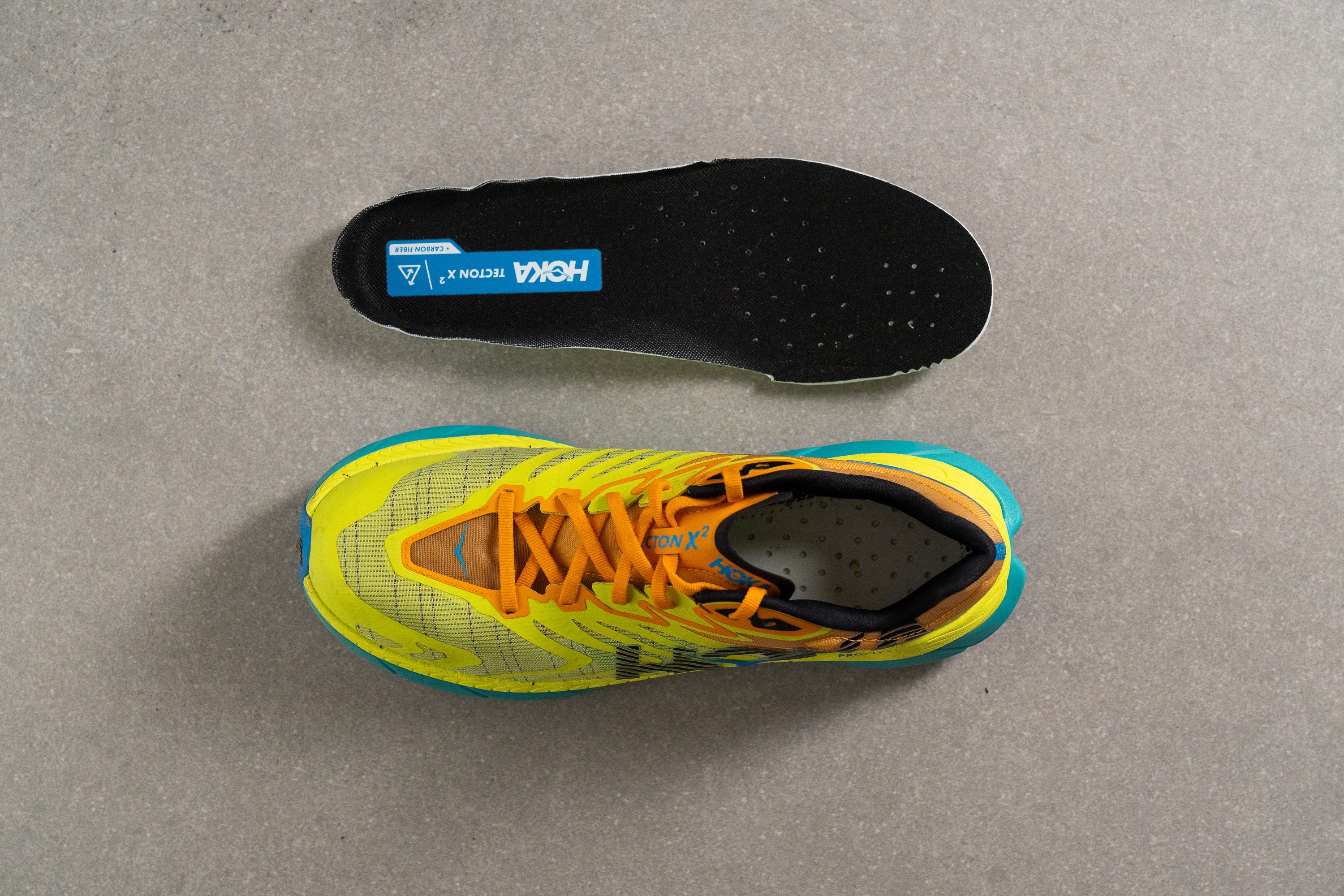
| Hoka Tecton X 2 | Yes |
Midsole softness in cold
In colder temperatures, the midsole maintains a similar feel. To gauge the exact change, we remeasured it after 20 minutes in the freezer. The resulting measurement was a slightly firmer 23.5 HA.
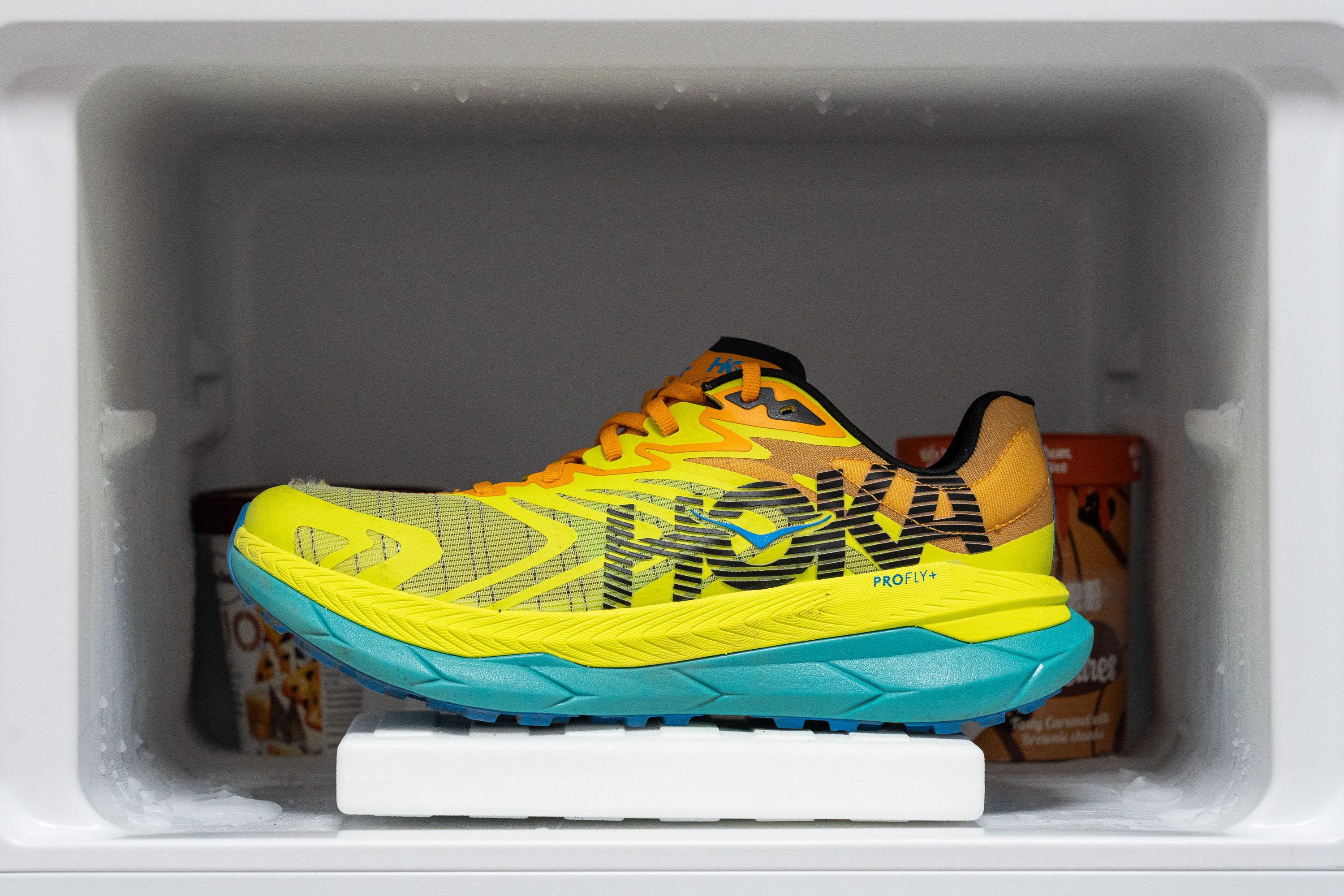
| Hoka Tecton X 2 | 23.5 HA |
| Average | 27.4 HA |
Midsole softness in cold (%)
This is just a 7.8% difference, aligning with the best foams in the market. We were genuinely impressed with this outcome!
While it's true that the energy return doesn't quite match PEBA compounds, the performance of this CMEVA foam under cold temperatures is remarkable.
| Hoka Tecton X 2 | 8% |
| Average | 26% |
Reflective elements
Regrettably, Hoka overlooked including reflective elements in the Tecton X 2, a significant oversight. For a shoe designed for ultra distances which usually involves racing at night, the absence of this feature is quite disappointing.
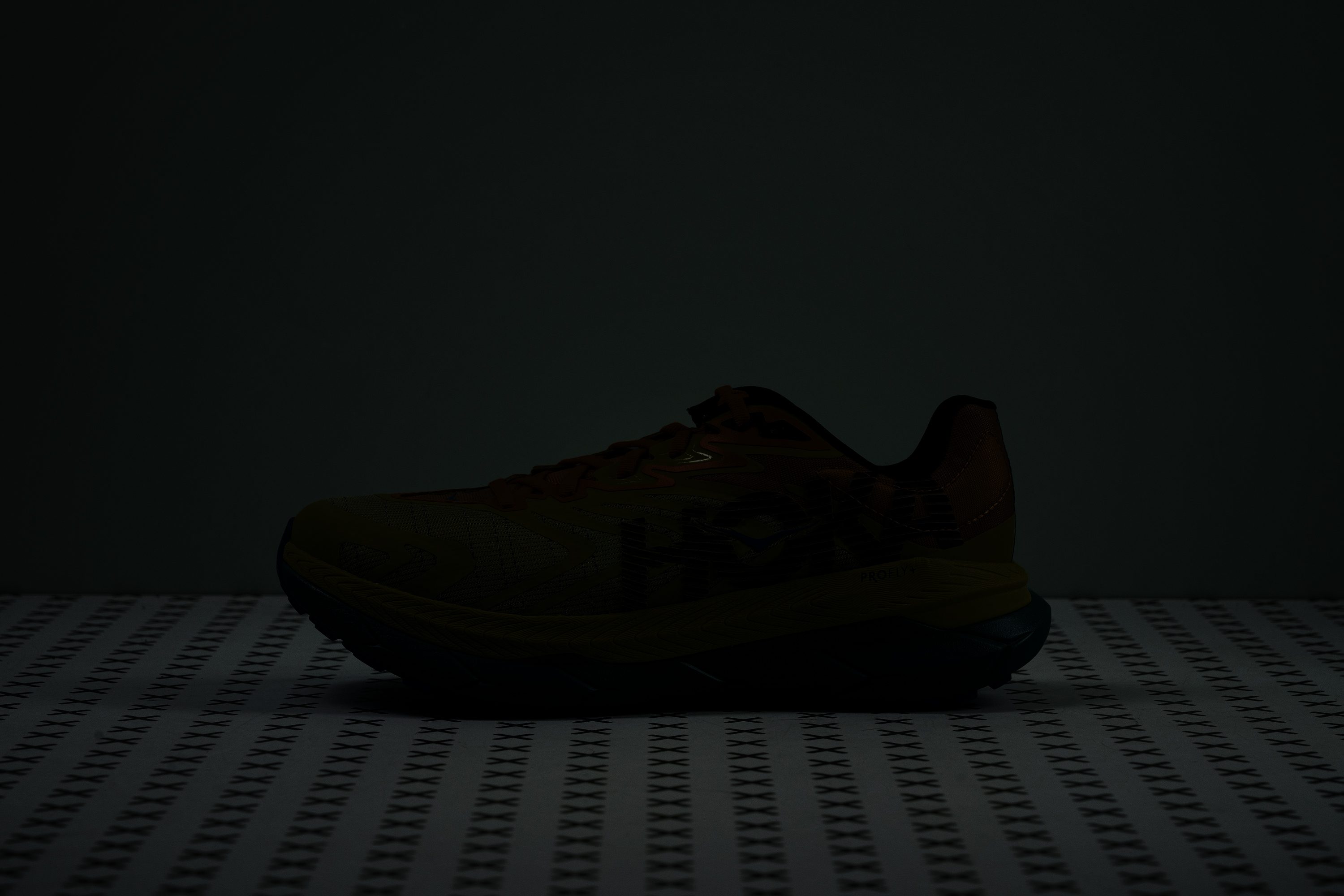
| Hoka Tecton X 2 | No |
Tongue padding
Hoka's dedication to minimizing weight in the Tecton X 2 is evident, especially with the inclusion of a thin tongue, which we measured at just 2.6 mm.
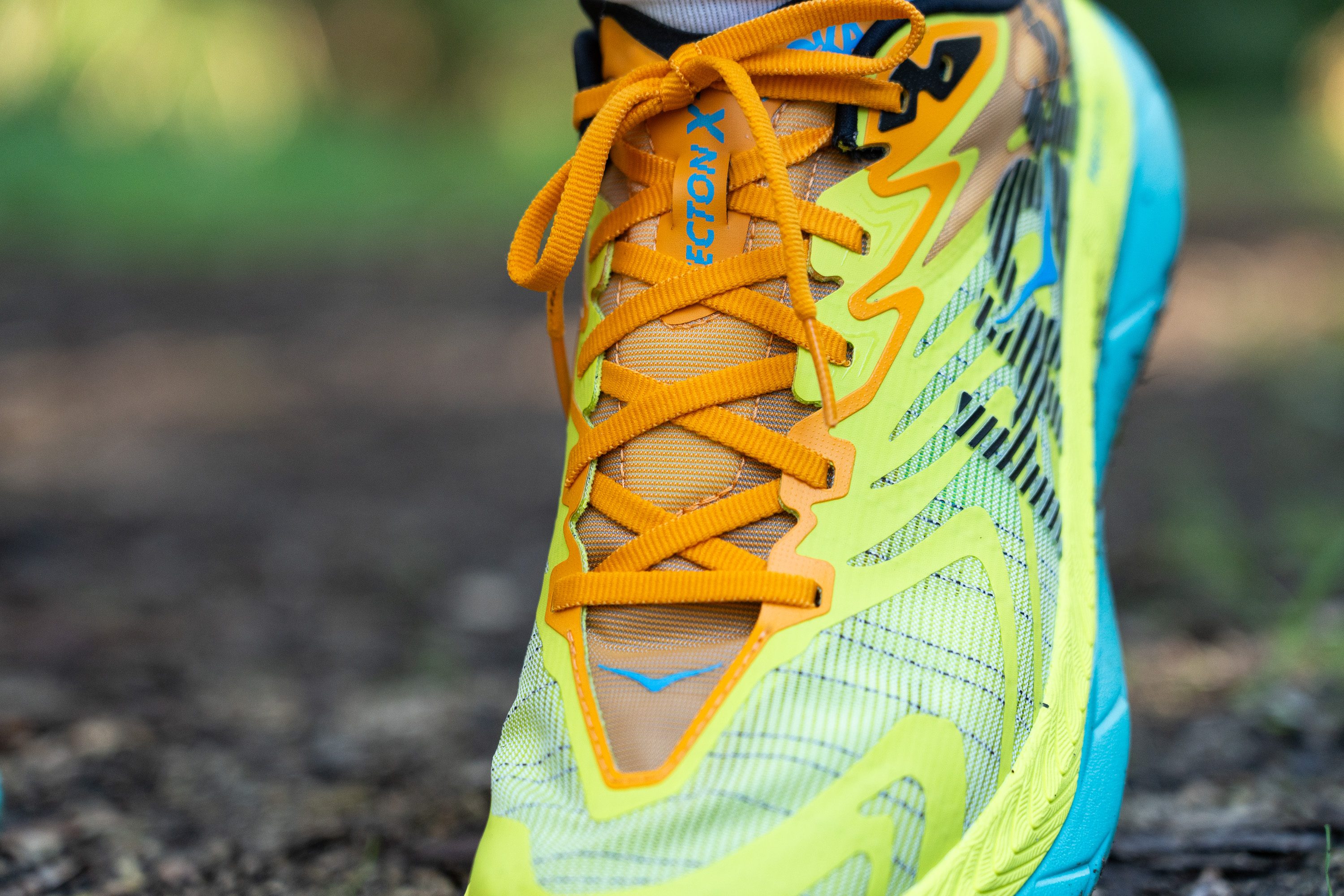
This design choice might concern some, particularly for ultra-distance racing and the risk of lace bite. However, we were content during our tests.
It's worth noting, though, that you might need to be more cautious when tying the laces compared to shoes with double or triple this amount of padding.
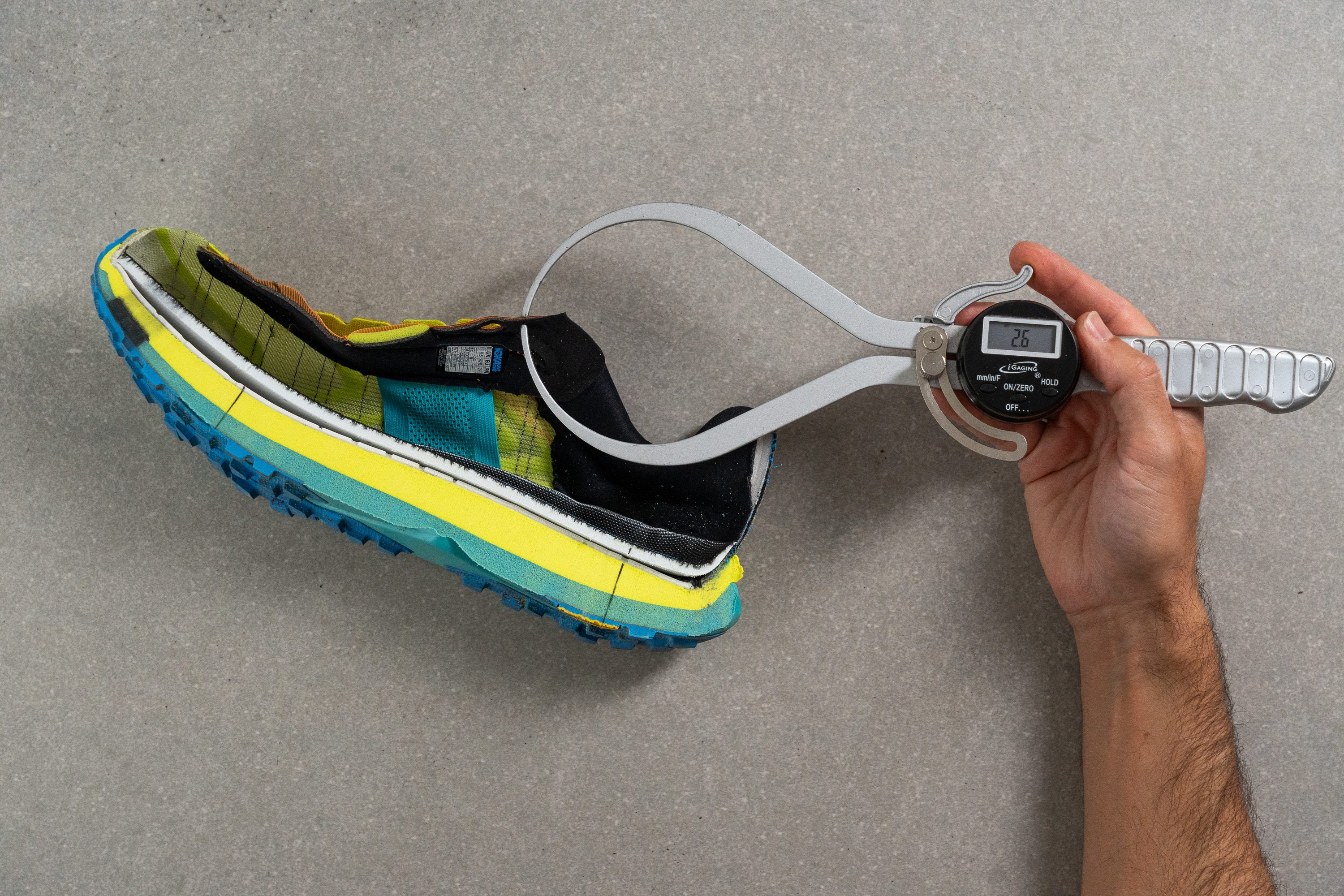
| Hoka Tecton X 2 | 2.6 mm |
| Average | 6.4 mm |
Tongue: gusset type
The semi-gusseted tongue we found offers an exceptional lockdown. Although we typically favor fully-gusseted or boot-like tongues in trail running shoes, in this specific instance, we believe this design choice is spot on.
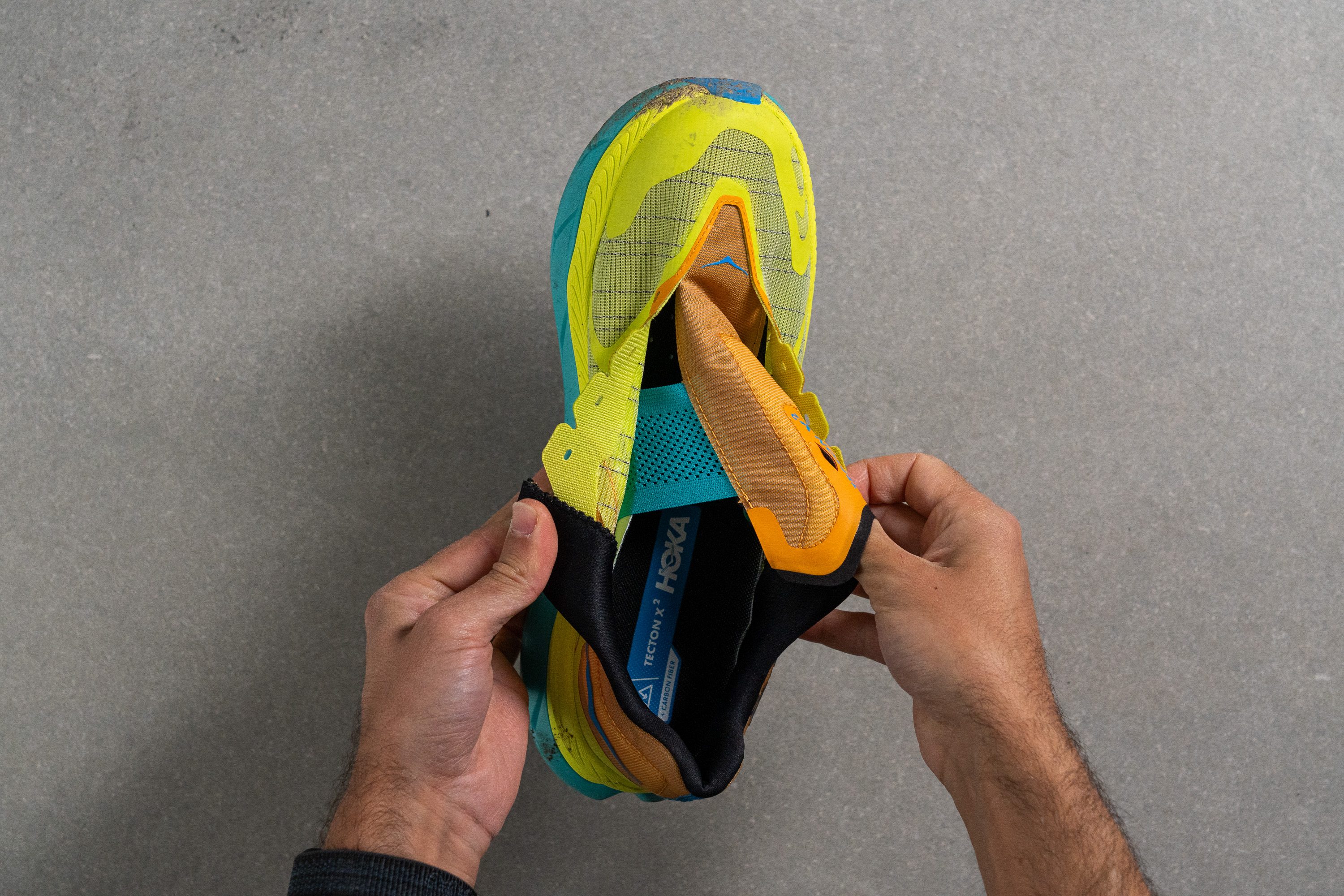
| Hoka Tecton X 2 | Both sides (semi) |
Heel tab
The absence of a heel tab wasn't an issue for us, and it contributes to the overall weight savings of the shoe.
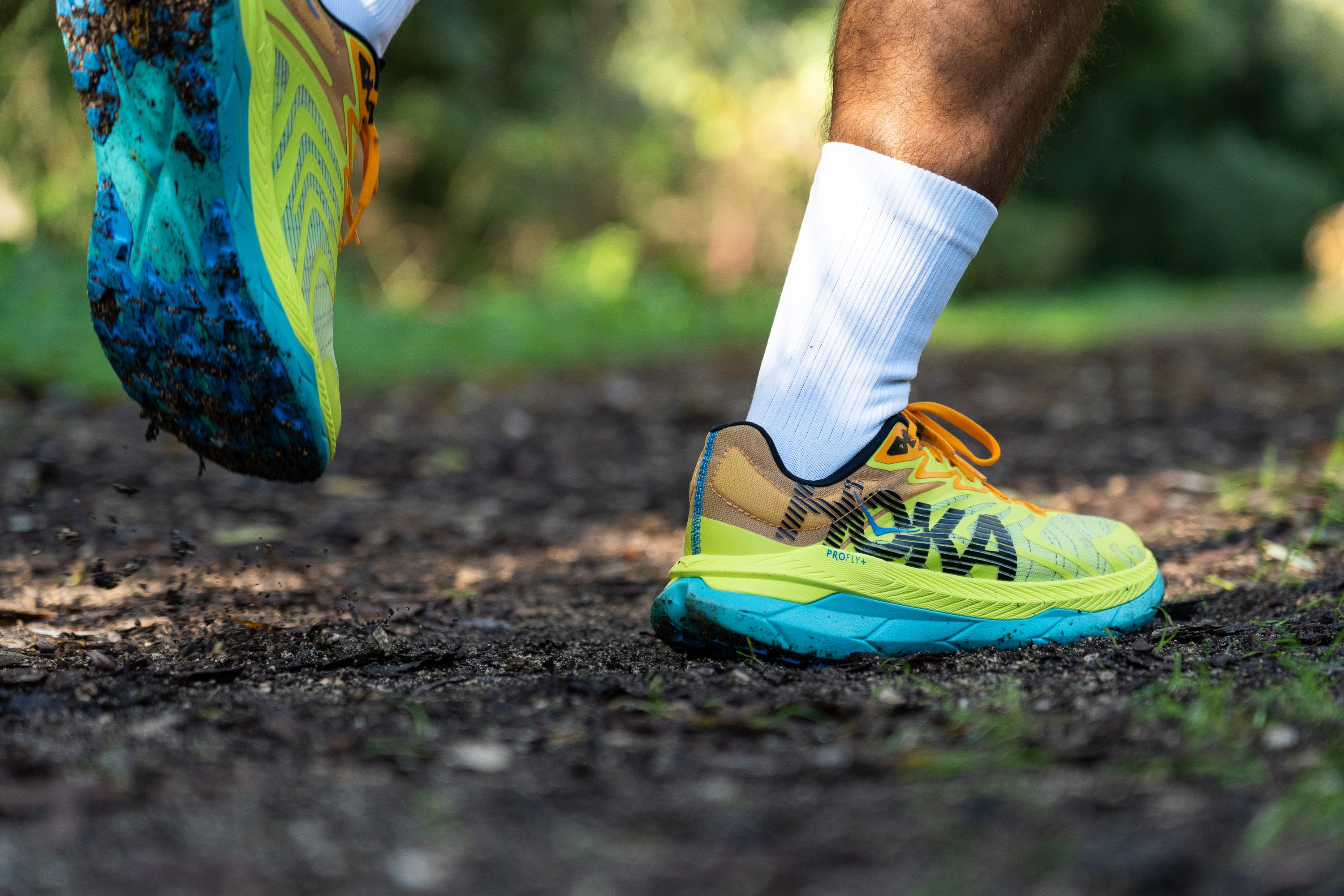
| Hoka Tecton X 2 | None |

